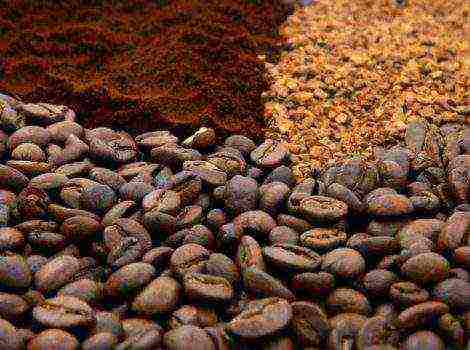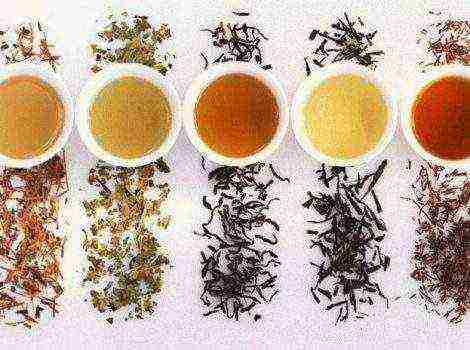Content
- 1 Daffodils - what are they? Daffodils with an overview by group
- 2 Daffodils - photo: Daffodils with the name of the variety and photo
- 2.1 Variety - Orange (Orangery)
- 2.2 Variety - Palmares
- 2.3 Variety - Intrigue (Intrique)
- 2.4 Variety - Flowerbed (Floverdrift)
- 2.5 Variety - Dear Love
- 2.6 Variety - Good Mood (Narcissus Erlicheer)
- 2.7 Variety - Rainbow (Rainbow of Colors)
- 2.8 Variety - Gloriosus
- 2.9 Variety - Floralie
- 2.10 Variety - Chanterelle
- 2.11 Variety - Trepolo
- 2.12 Sort - Berlin (Berlin)
- 2.13 Variety - Flyer
- 2.14 Variety - Irene Copeland
- 3 Daffodils - planting and care
- 4 Poetic daffodil
- 5 Yellow daffodil
- 6 White daffodil
- 7 Pink daffodil
- 8 Narcissus Tete-a-Tete
- 9 Terry daffodils
- 10 What daffodils and their bulbs look like (with photo)
- 11 How to grow and how to care for daffodils
- 12 How to plant daffodils: planting and caring for bulbs outdoors
- 13 Should you dig up daffodils and how to store the bulbs?
- 14 Varieties of tubular daffodils with photos and names
- 15 Varieties of large-crowned and small-crowned groups of daffodils
- 16 The best varieties of the terry group of daffodils
- 17 Trindrus daffodil varieties
- 18 Cyclamen-like, Jonquillian and tacetal groups of daffodils
- 19 Poetic and wild-growing daffodil classes
- 20 The best varieties of the split-crown group of daffodils
Daffodils are decorative perennial plants. They belong to perennial bulbous plants of the amaryllis family. The flowers are usually yellow or white, single or several at the top of the peduncle. Many people love these flowers and plant them to improve the landscape design of their summer cottage.
The purity of "friendly eyes" looks at us in the spring garden. A garden without daffodils, their charm, delicate, exquisite beauty and delicate aroma of flowers loses a lot. Plant just a few bulbs of this unpretentious plant in any corner of your property and you will see their beautiful bowed heads.
There are about 60 known species of daffodil that are common in the Mediterranean. Narcissus loves alpine meadows, mountain slopes, lowlands, mountain valleys.
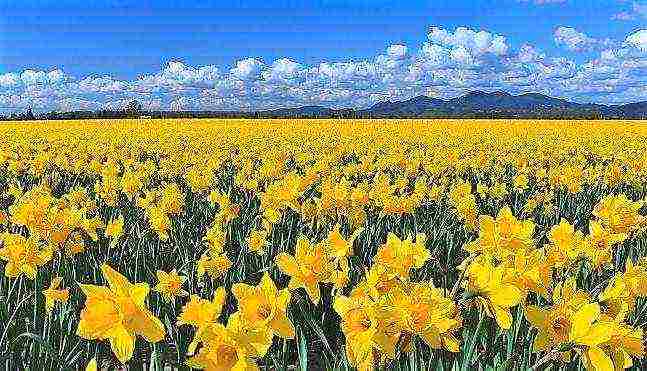
Content:
- - what are the reviews by groups
- - variety name with photo
- - planting and care
Daffodils - what are they? Daffodils with an overview by group
The Latin name for daffodil is Narcissus Poeticus. Comes from the Greek words "narkao" - intoxicate, stun and "poeticus" (poetic) - evokes a poetic mood. Daffodils are always beautiful.
According to the modern classification, all varieties are divided into eleven groups. Groups are determined by the ratio of the length of the petals to the height of the crown, the number of flowers on one peduncle, the color of the perianth and crown lobes. Let's analyze each group separately.
Tubular
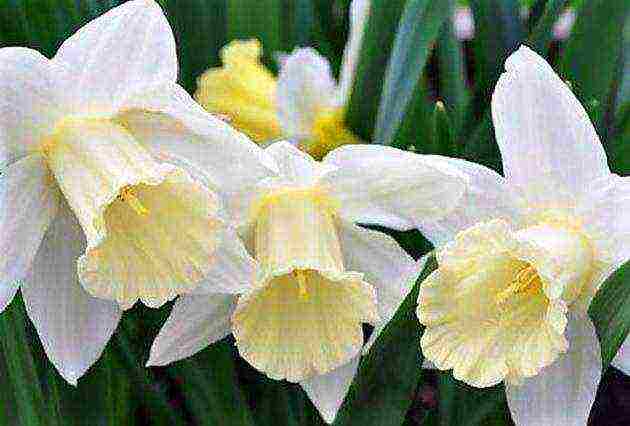
Flowers are single. The tube is the same size or longer than the perianth lobes. In turn, the group is subdivided into subgroups, distinguished by the color of the monochromatic and the tube:
- in the first subgroup - the perianth and tube are colored (the latter is slightly paler)
- in the second subgroup - the perianth is white, and the tube is colored
- in the third subgroup, everything is white
- in the fourth subgroup - a different combination of colors
Large-crowned
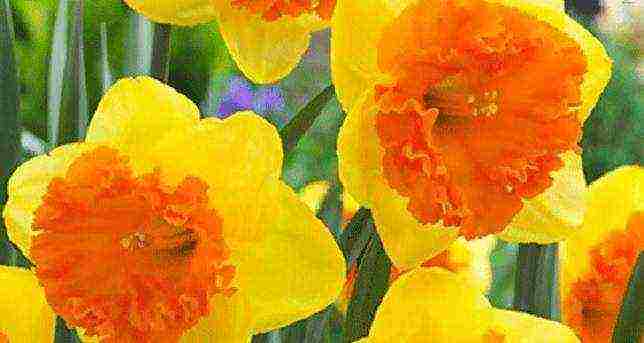
Flowers are single. The height of the crown is more than one third of the length of the perianth lobes. Large-crowned daffodils are divided into subgroups in the same way as tubular.
Crowned
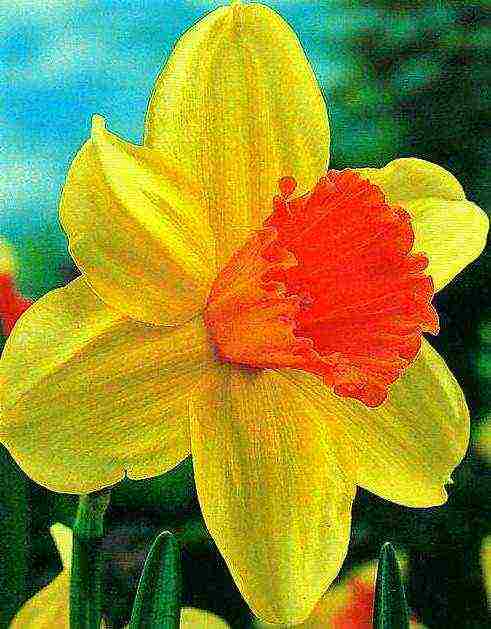
The flowers are solitary, the crown is not more than a third of the length of the perianth lobes.They are divided into subgroups in the same way as tubular and large-crowned.
Terry
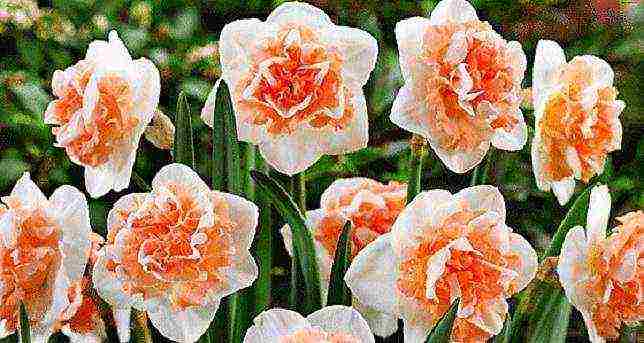
They are called by the doubleness of the flowers.
Triandrus
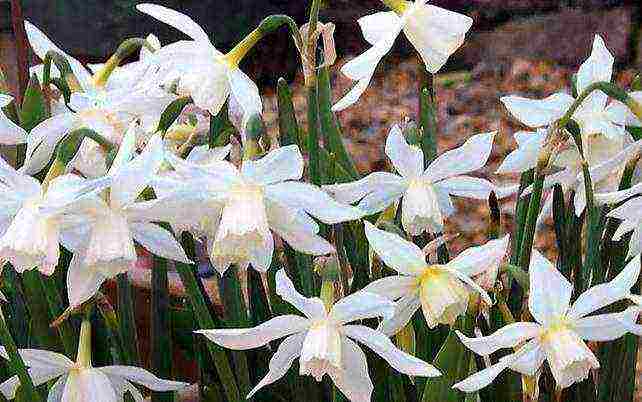
The flowers are drooping. The first subgroup includes those plants in which the crown is larger in size, and the second - less than two-thirds of the length of the perianth lobes.
Cyclameniform
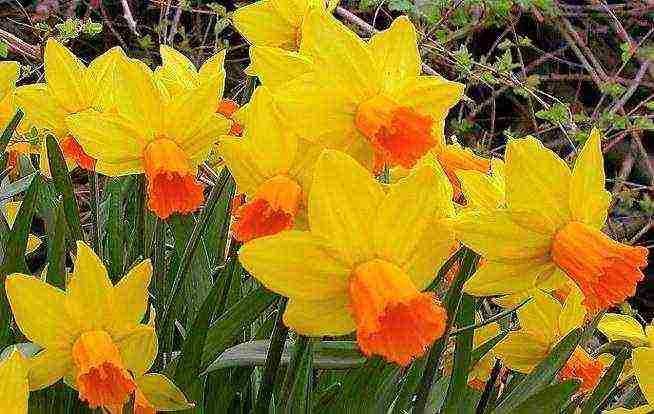
Like triandrus plants, the flowers are drooping. Perianth lobes are strongly bent outward. The division into subgroups is similar to the fifth group.
Jonquiliform
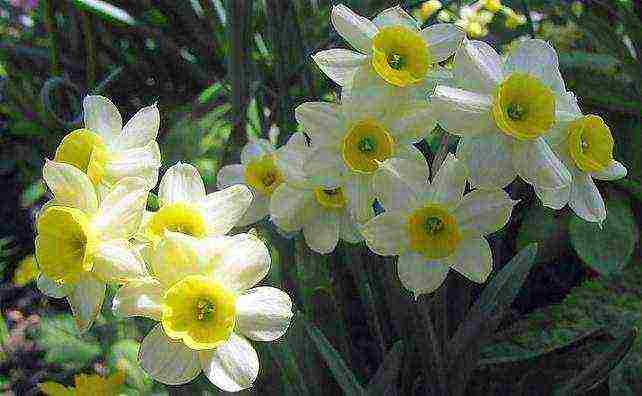
Flowers are collected in clusters of two to six on one peduncle. The group is divided into subgroups:
- in the first subgroup - the crown is larger
- in the second subgroup - less than two-thirds of the length of the perianth lobes
Tacetate
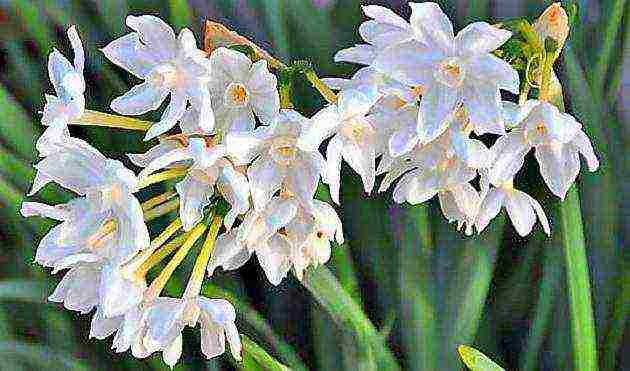
Flowers (from three to twelve) are collected in inflorescences.
Poetic (real)
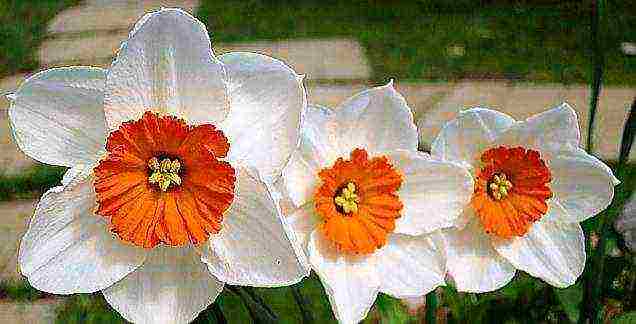
Flowers are single. The crown is saucer-shaped, much shorter than the length of the perianth lobes.
Wild plants and their hybrids
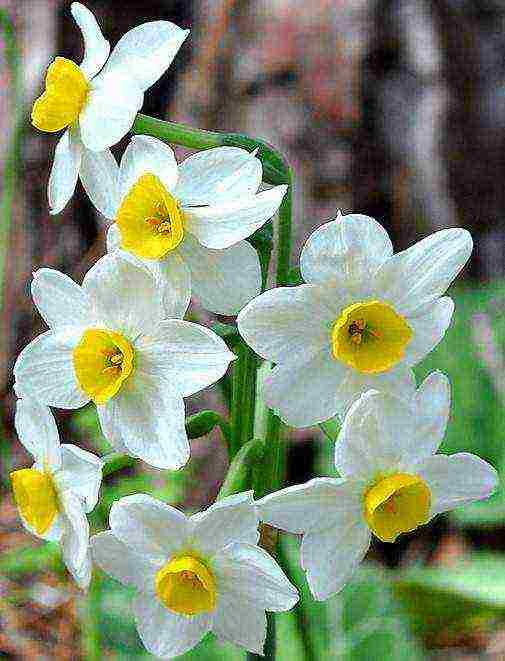
Other
This group includes those plants that are not included in any of the ten groups.
All types of daffodil are highly poisonous.
Daffodils - photo: Daffodils with the name of the variety and photo
Modern varieties pleasantly surprise with rather unusual shapes and a wide range of colors - from snow-white to creamy-white, creamy and greenish-white and from lemon-yellow to bright saffron-yellow, dark orange. Among the latest breeding novelties, there are even outlandish pink and white flamingos.
Variety - Orange (Orangery)
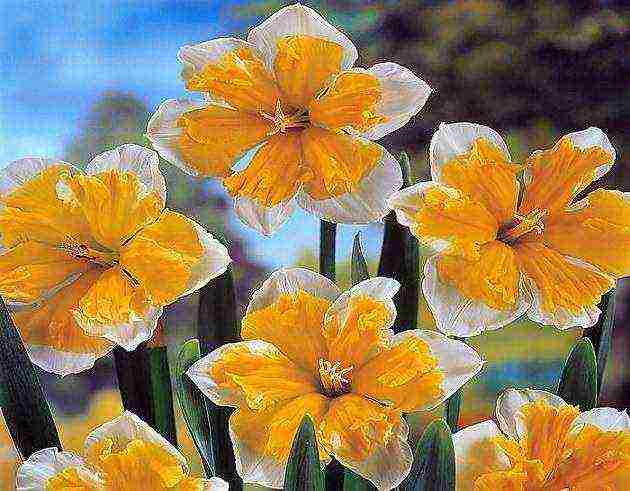
Variety - Palmares
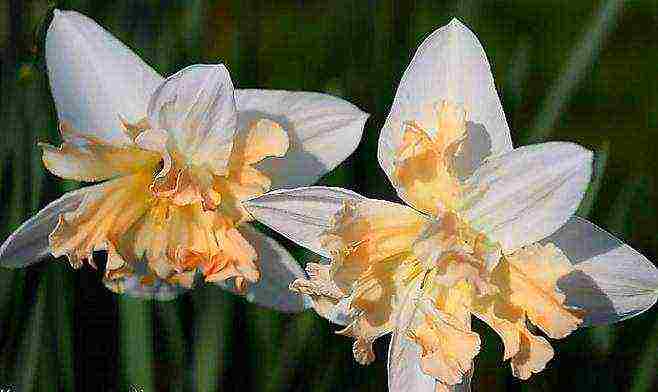
Variety - Intrigue (Intrique)
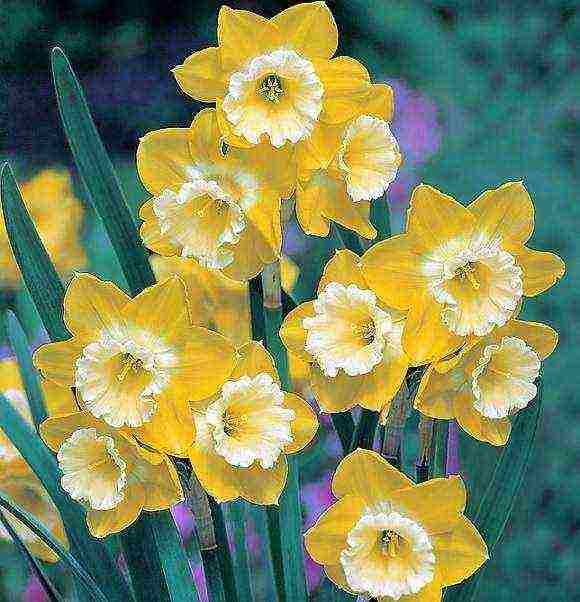
Variety - Flowerbed (Floverdrift)
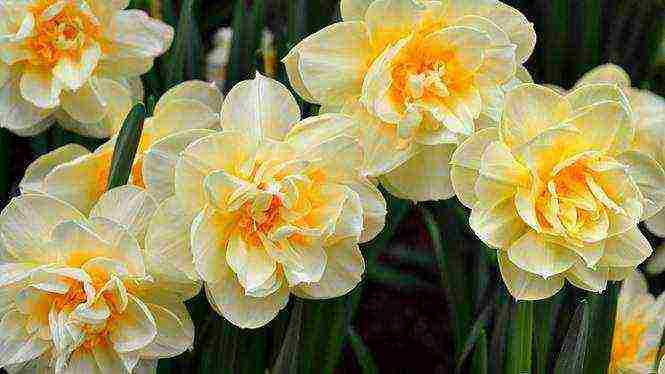
Variety - Dear Love
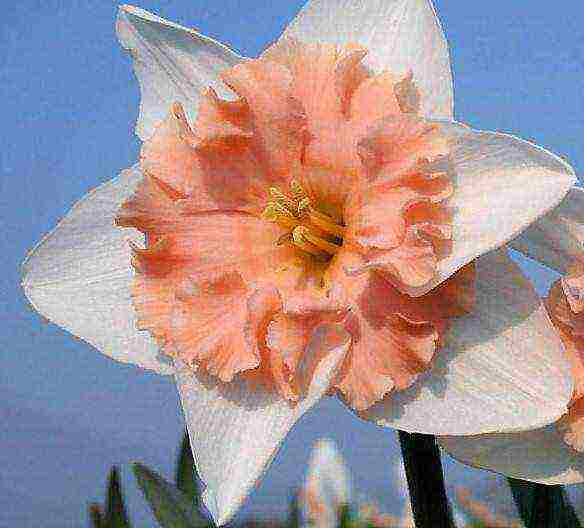
Variety - Good Mood (Narcissus Erlicheer)
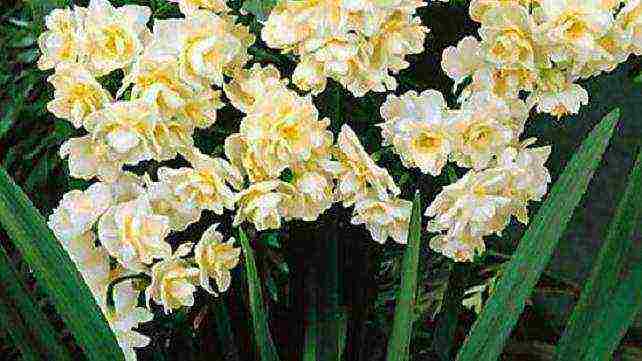
Variety - Rainbow of Colors
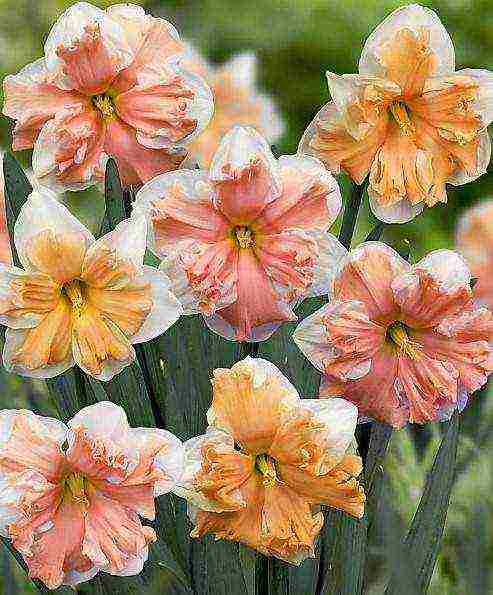
Variety - Gloriosus
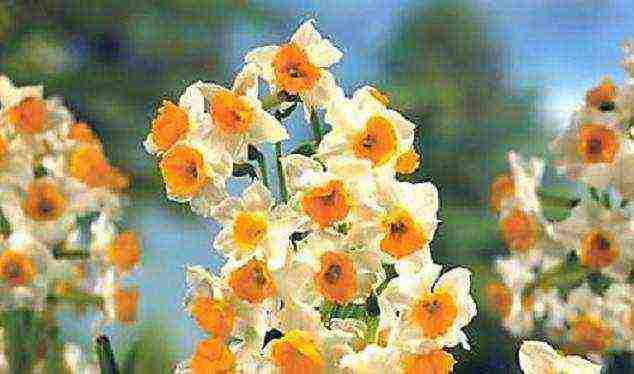
Variety - Floralie
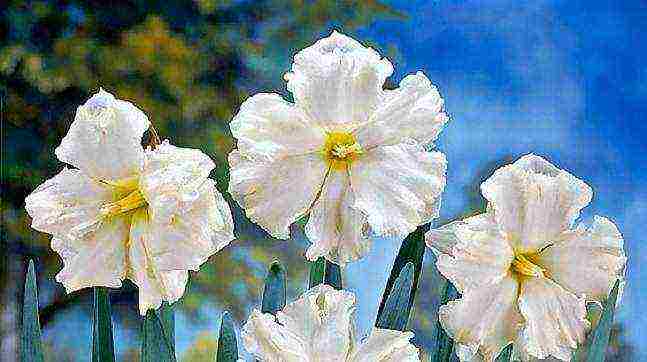 Narcissus floralie
Narcissus floralie
Variety - Chanterelle
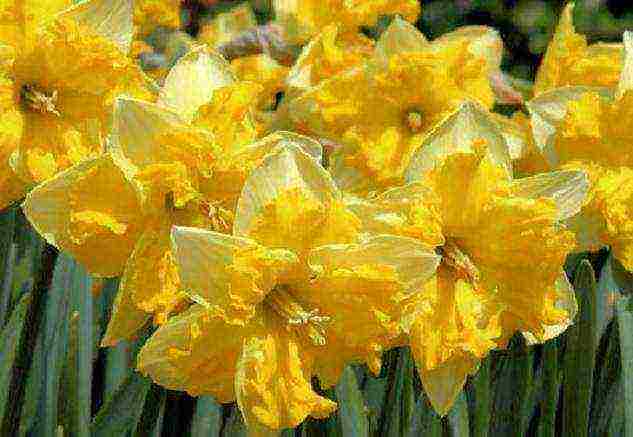
Variety - Trepolo
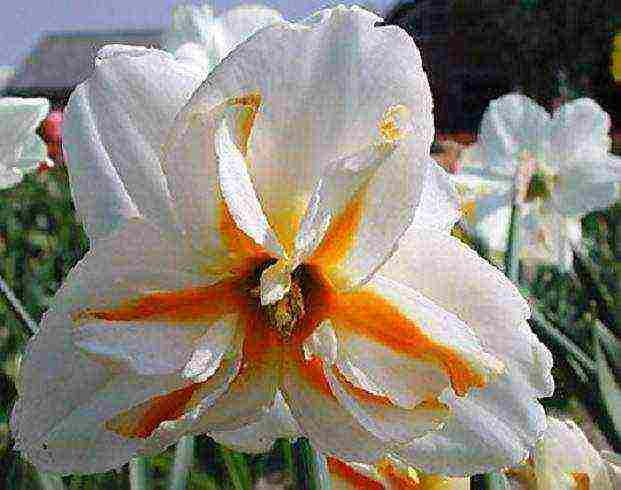
Sort - Berlin (Berlin)
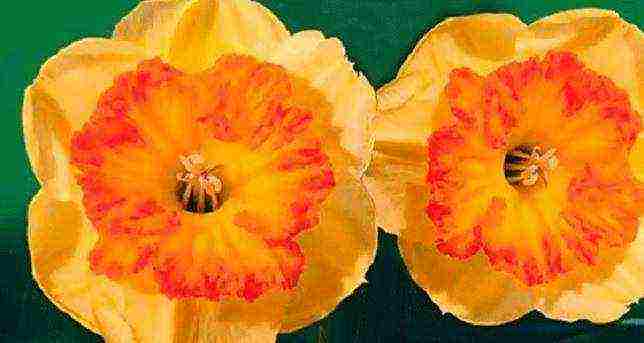
Variety - Flyer
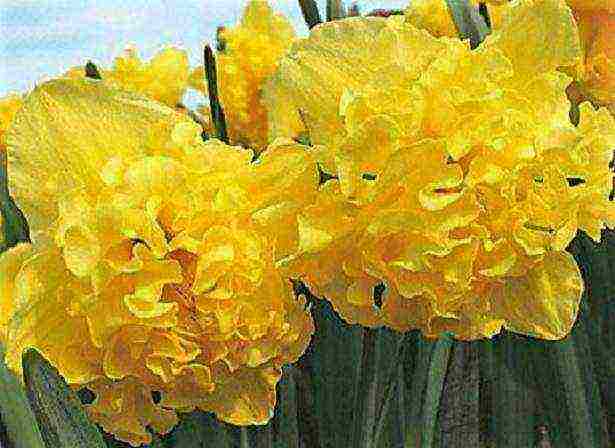
Variety - Irene Copeland
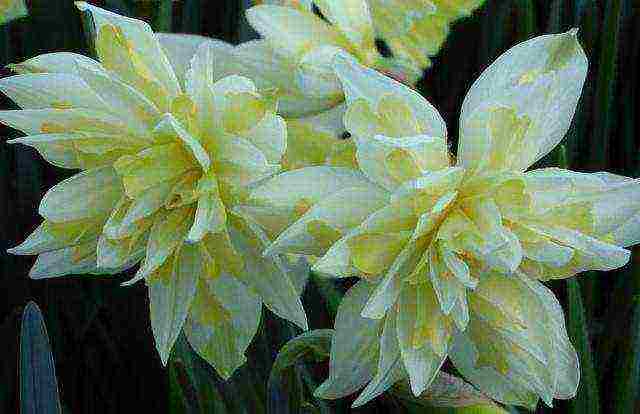
Daffodils - planting and care
Narcissus, like the tulip, belongs to ephemeroid plants, that is, vegetative in spring and early summer. Its flowering is long and depends on the variety and weather conditions. By selecting varieties, you can extend the period of flowering daffodils to thirty or more days. Usually, outdoors, they bloom in the second half of May.
Planting (reproduction)
Daffodils are propagated by bulbs and babies. For growing daffodils, areas with light to medium loamy soils, with good drainage, and where the groundwater is at a depth of at least 60 cm are most suitable. The soil must be cultivated, contain a lot of organic matter and have a neutral reaction.
If you live in the Middle Urals, then it is advisable to start planting in the second half of August. It is very important that the bulbs take root before the onset of stable cold weather, otherwise they overwinter badly and often die.
The optimum soil temperature for rooting is 9 - 17 degrees. After planting, the soil is watered.
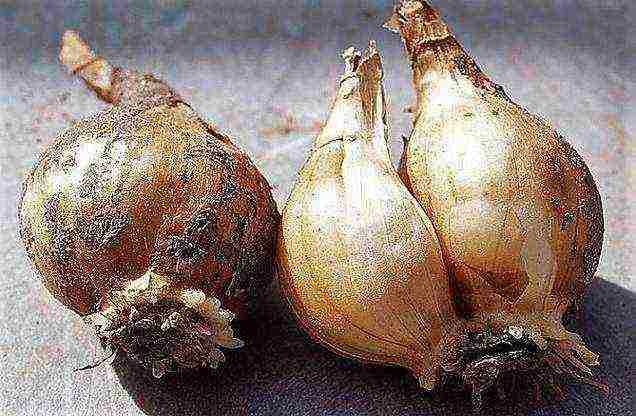
The planting depth depends on the mechanical composition of the soil and the size of the planting material. For example, the bulbs of the first (diameter 4 cm or more) and the second (diameter 3.9 - 3.0 cm) are planted at 12 - 15 centimeters, and the children of the first (diameter 2.9 - 2.0 cm) and second (diameter less than 2.0 cm) categories are planted at 10 centimeters. On heavy soils, the depth decreases.
The distance between the bulbs in a row for parsing is 15, 10 - 12, respectively, and for children 8 - 10 centimeters.
When planting large material for growing plants on a cut for four to five years, the distance in a row between the bulbs of the first analysis is increased to 20 - 22 centimeters. Between rows, it depends on the planting and grooming method.
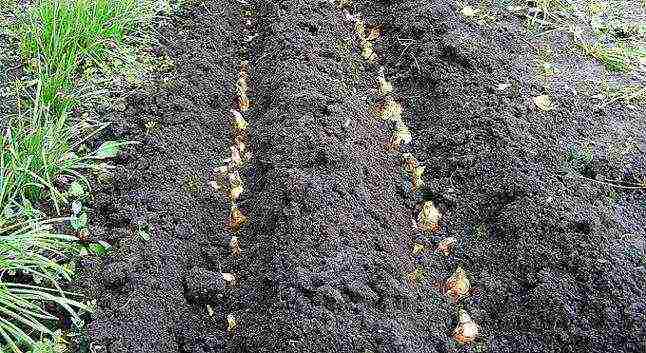
You can plant them in one line (between rows 45 and 70 cm) and two lines (between lines 20 and ribbons 50 cm). In small areas, the planting is four to five lines (20 cm between rows) with a track width of 30 - 40 centimeters.
Where there is a lot of rainfall, daffodils are grown on ridges 12 - 20 cm high and 100 - 120 centimeters wide.
Care
Planting care includes a number of agrotechnical measures: mulching, fertilizing, watering, loosening the soil, combating weeds, pests and diseases, removing diseased plants.
During the growing season, daffodils consume a lot of water. Its lack reduces the intensity of their growth and size.
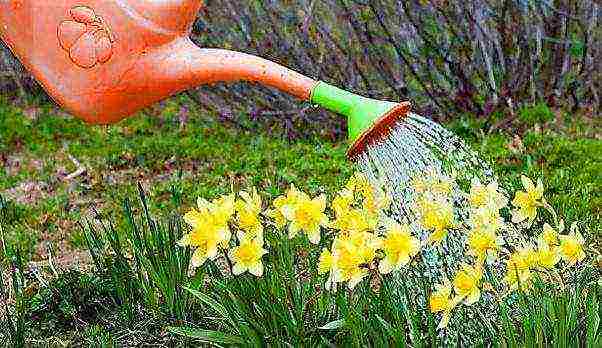
The soil should be moist after flowering. During this period, bulbs and babies grow intensively and nutrients accumulate in them.The irrigation rate depends on the characteristics of the soil, its moisture content. During the growing season, plants are watered 2 to 4 times.
The soil is loosened starting in spring throughout the growing season, usually after watering or rain. In areas covered with peat, the soil is loosened less often.
Daffodil pests
Like all beautiful plants, daffodils also have pests:
- Root onion mite. It lives in the soil on plant debris and settles in planted bulbs. Develops at 23 - 25 degrees. At temperatures below 10 degrees and soil moisture below 60%, the development of the tick stops.
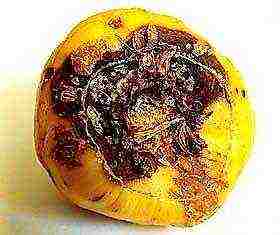
Adult mites and larvae eat up the bottoms and scales of the bulbs. Such daffodils do not grow. The causative agents of fungal and bacterial diseases settle on the damaged tissues. In the fight against mites, it is necessary to destroy plant debris, carefully select planting material. Effectively soaking the bulb before planting in malofos (0.5%) for 30 minutes.
- Onion and tuberous hoverfly. Greenish-bronze onion hoverfly. On the sides of the abdomen there are three semi-lunar light spots, body length 6.5 - 9 millimeters. The lumpy hoverfly is similar in appearance and lifestyle to the onion. The fly begins in June 0-July.

The female lays eggs in the soil and on the lower parts of the plants. The larvae penetrate the bulb, hibernate in it and damage it. The fight against hoverflies is the same as with the onion mite. During oviposition, the soil near the plants is watered with the same karbofos solution.
There are many legends about daffodil flowers. In all legends, a delicate flower is associated with water. So, in China it is called the flower of the "water god". Here, daffodils give when they want to thank a person for their kindness.
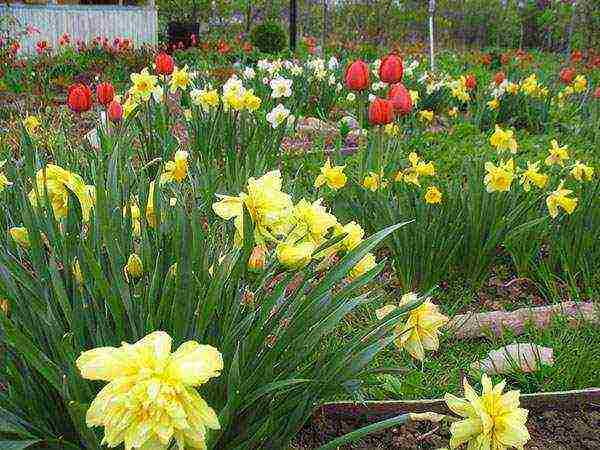 Not everyone knows, but there are many varieties of daffodils. Plants differ in the type of flower, the method of growing, the period and duration of flowering. Consider the most popular and most beautiful varieties of daffodils, their photos and the correct name.
Not everyone knows, but there are many varieties of daffodils. Plants differ in the type of flower, the method of growing, the period and duration of flowering. Consider the most popular and most beautiful varieties of daffodils, their photos and the correct name.
Poetic daffodil
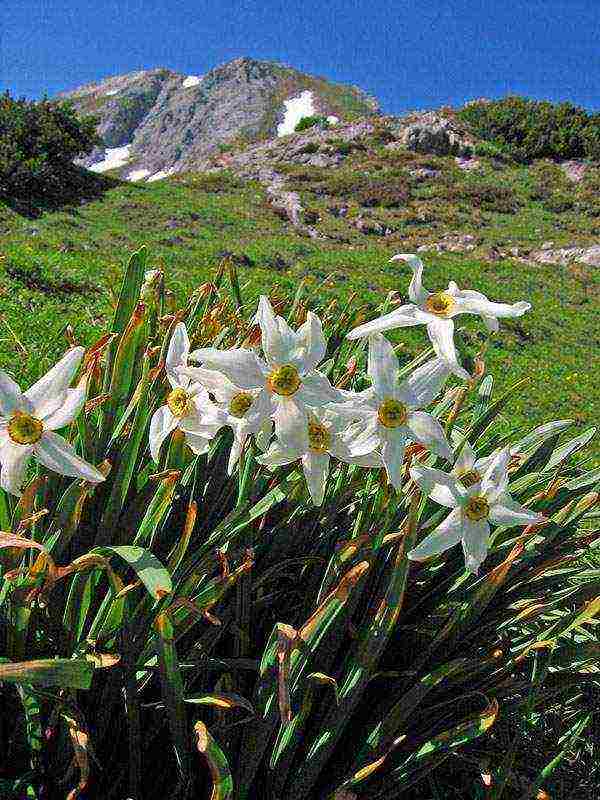 The flower was brought from the mountainous regions. In nature, the poetic daffodil lives on hills, near water bodies and springs. The species was originally bred near the Mediterranean Sea and not far from Italy. The plant grows rapidly and blooms among chestnut trees. For full development, the flower needs moderate moisture and direct sunlight. The flower grows up to 50 centimeters in height. Propagated by bulbs that are in the shape of a ball or chicken egg, with a pointed end. One bush of the poetic daffodil produces up to five flat, long leaves. They are bright green in color. Flowers bloom on a single branch, white, heads look down. Inside they have a crown of bright yellow color.
The flower was brought from the mountainous regions. In nature, the poetic daffodil lives on hills, near water bodies and springs. The species was originally bred near the Mediterranean Sea and not far from Italy. The plant grows rapidly and blooms among chestnut trees. For full development, the flower needs moderate moisture and direct sunlight. The flower grows up to 50 centimeters in height. Propagated by bulbs that are in the shape of a ball or chicken egg, with a pointed end. One bush of the poetic daffodil produces up to five flat, long leaves. They are bright green in color. Flowers bloom on a single branch, white, heads look down. Inside they have a crown of bright yellow color.
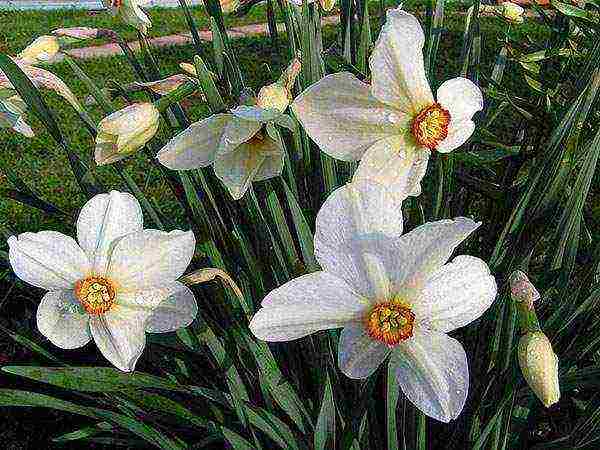 The species was first bred in 1538. The Italians liked the daffodil for its strong fragrance. The size of the blossoming flower reaches six centimeters. The flower-bearing stalk grows longer than the leaves and can reach fifty centimeters. The plant emerges from the ground in early spring, is actively growing and begins to bloom in the month of May. Flowering period up to 12 days.
The species was first bred in 1538. The Italians liked the daffodil for its strong fragrance. The size of the blossoming flower reaches six centimeters. The flower-bearing stalk grows longer than the leaves and can reach fifty centimeters. The plant emerges from the ground in early spring, is actively growing and begins to bloom in the month of May. Flowering period up to 12 days.
When the temperature drops below 10 degrees in winter, the flower requires shelter.
After reviewing the photo with the daffodil and the description of the variety, you can choose the plant you like of the poetic daffodil and breed it on your site.
Yellow daffodil
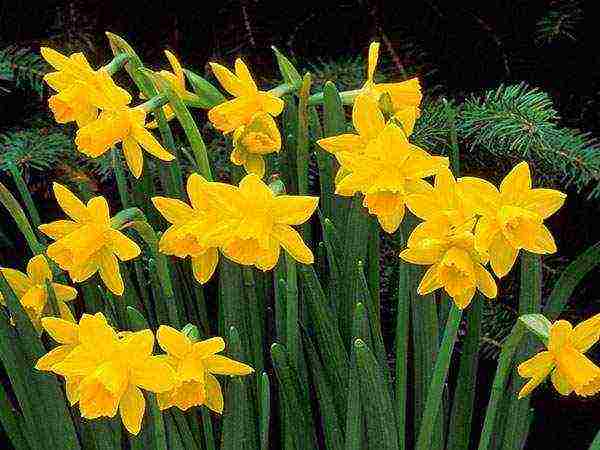 The representative of this variety has a second name - false daffodil. The flower was brought from France, Germany and southern Italy. Grows well on the slopes of the Caucasus Mountains. The yellow daffodil grows short. An adult plant reaches 30 centimeters. Propagated by bulbs, the diameter of which does not exceed 5 centimeters. They are round, less often oval. One flower blooms on a flower stem, which reaches a diameter of 4 cm. The flower, in the process of active growth, releases thin, dark green leaves, which are located 10 centimeters below the flower.
The representative of this variety has a second name - false daffodil. The flower was brought from France, Germany and southern Italy. Grows well on the slopes of the Caucasus Mountains. The yellow daffodil grows short. An adult plant reaches 30 centimeters. Propagated by bulbs, the diameter of which does not exceed 5 centimeters. They are round, less often oval. One flower blooms on a flower stem, which reaches a diameter of 4 cm. The flower, in the process of active growth, releases thin, dark green leaves, which are located 10 centimeters below the flower.
Inside the blossoming flower there is a crown, bright yellow in color with a corrugated uneven edge.The flowering period of the yellow daffodil begins in mid-May. It lasts no more than 15 days. The flower has been bred and introduced into garden culture since 1500.
Thanks to this variety, many forms of the plant have been bred by crossing.
Gardeners use yellow daffodil for ennobling near house plots and rocky gardens, planting them next to tulips, a royal crown, in mixed plantings and compositions with juniper.
White daffodil
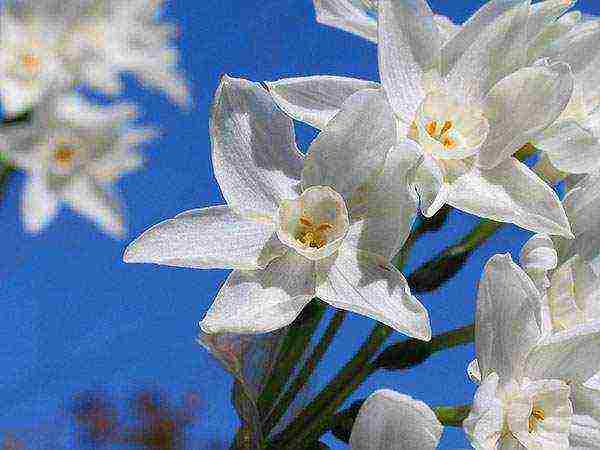 The flower was brought from the Iberian Islands. It grows well on mountain slopes enriched with picturesque vegetation, including abundant grass. White daffodil can be seen in acidified soil or pine forests. An adult flower reaches 35 centimeters. Propagated and planted with bulbs. They are no more than 4 cm in size and are spherical. The flower has thin, multiple green leaves. The flower-bearing stalk does not exceed 23 centimeters. The flower is white, like the inner crown.
The flower was brought from the Iberian Islands. It grows well on mountain slopes enriched with picturesque vegetation, including abundant grass. White daffodil can be seen in acidified soil or pine forests. An adult flower reaches 35 centimeters. Propagated and planted with bulbs. They are no more than 4 cm in size and are spherical. The flower has thin, multiple green leaves. The flower-bearing stalk does not exceed 23 centimeters. The flower is white, like the inner crown.
White daffodil has been introduced into culture since 1579. It begins to grow actively in mid-spring. By the end of May, the flower dissolves flowers, which are fragrant for no more than 10 days.
When grown in low temperatures, daffodils should be covered during the cold season.
Pink daffodil
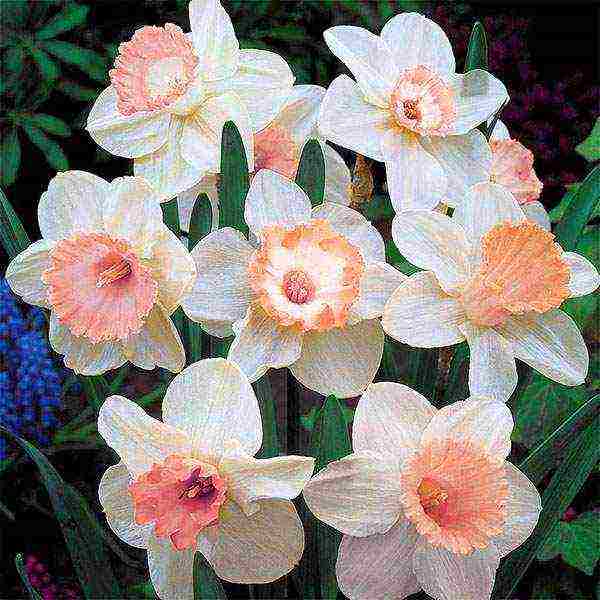 The flower was brought from western Italy in 1520. At about the same time, the variety was introduced to the culture in the south of France. Pink daffodil differs from other plant species in its rather high size. The flower reaches 45 centimeters. The leaves are dark green and wider than that of other species by 0.5 centimeters. Differs in the color of the flower itself. During the flowering period, 1 bud is located on the pedicel. The flower has a white color with a pale pink crown, quite unusual for this group of plants.
The flower was brought from western Italy in 1520. At about the same time, the variety was introduced to the culture in the south of France. Pink daffodil differs from other plant species in its rather high size. The flower reaches 45 centimeters. The leaves are dark green and wider than that of other species by 0.5 centimeters. Differs in the color of the flower itself. During the flowering period, 1 bud is located on the pedicel. The flower has a white color with a pale pink crown, quite unusual for this group of plants.
Pink daffodil propagates with the help of bulbs. In an adult plant, they can reach 5 centimeters. Daffodil blooms in early May. To preserve the flower, it is better to dig up the bulb for a period of rest and keep it in a dark place until the onset of spring. Pink daffodil can not only beautify the garden area, but also surprise guests. The plant will draw attention to the flower bed in any design.
Narcissus Tete-a-Tete
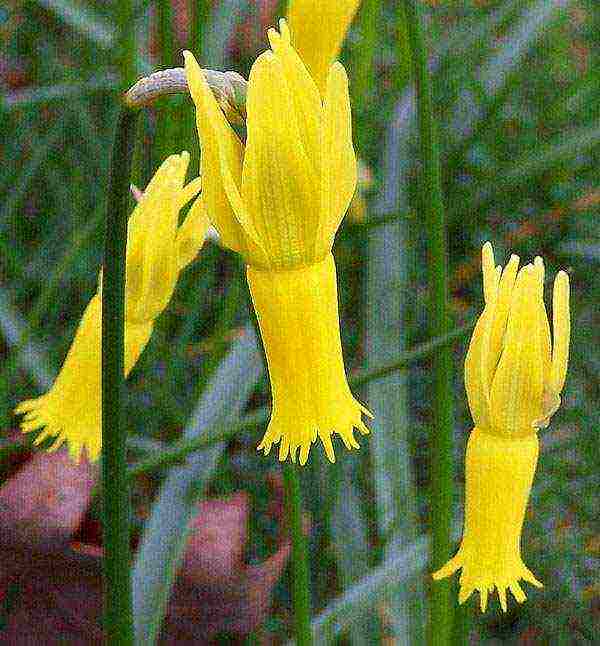 The flower belongs to the cyclamen group. Narcissus Tet-a-Tet has been cultivated since 1584. Brought from the mountains of the Caucasus and Germany. The plant reaches a short stature. Most often, the daffodil does not exceed 25 centimeters in height. One inflorescence is located on the peduncle. The bud has a drooping appearance, strongly lowered to the ground. The flower is bright yellow in color with unusual petals raised up.
The flower belongs to the cyclamen group. Narcissus Tet-a-Tet has been cultivated since 1584. Brought from the mountains of the Caucasus and Germany. The plant reaches a short stature. Most often, the daffodil does not exceed 25 centimeters in height. One inflorescence is located on the peduncle. The bud has a drooping appearance, strongly lowered to the ground. The flower is bright yellow in color with unusual petals raised up.
Narcissus Tet-a-Tet blooms from the beginning of May. Has a pleasant aroma. Drought intolerant. Plants are planted along curbs and low fences. It grows well and produces new globular bulbs. During wintering, the flower is dug up and stored in a dark, cool place until spring.
In ancient Rome, daffodils were considered flowers to symbolize victory. After the battle, the winner was hung a garland of this plant around his neck. Spectators brought live bouquets to some heroes of the fights.
Terry daffodils
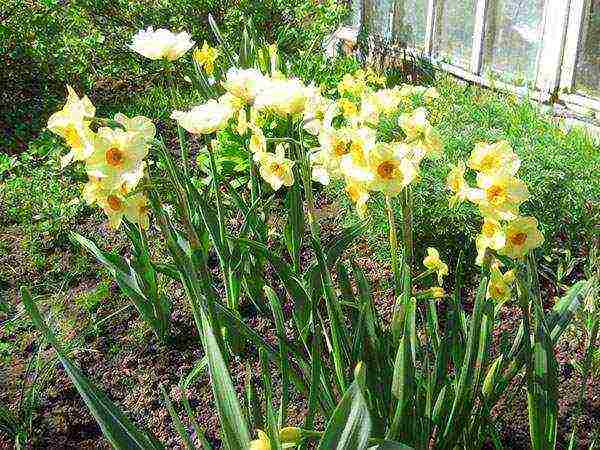 Most varieties of double daffodils are imported from South America. The plant loves a humid climate and does not tolerate prolonged drought. This group includes several types of daffodils, varieties with a photo, name and description are presented below.
Most varieties of double daffodils are imported from South America. The plant loves a humid climate and does not tolerate prolonged drought. This group includes several types of daffodils, varieties with a photo, name and description are presented below.
Gay Challenger
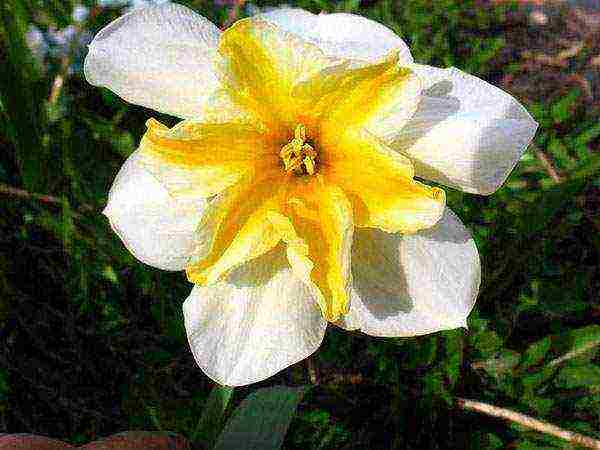 A low-growing plant with dark green leaves 0.5 centimeters wide. On each peduncle there is 1 flower of extraordinary beauty. During the flowering period, the double daffodil has a yellow flower with a bright orange crown, uneven in size. The bud size can exceed 7 centimeters. Flowers decorate bouquets, it has no equal when cutting. It begins to bloom at the end of May.
A low-growing plant with dark green leaves 0.5 centimeters wide. On each peduncle there is 1 flower of extraordinary beauty. During the flowering period, the double daffodil has a yellow flower with a bright orange crown, uneven in size. The bud size can exceed 7 centimeters. Flowers decorate bouquets, it has no equal when cutting. It begins to bloom at the end of May.
Variety Texas
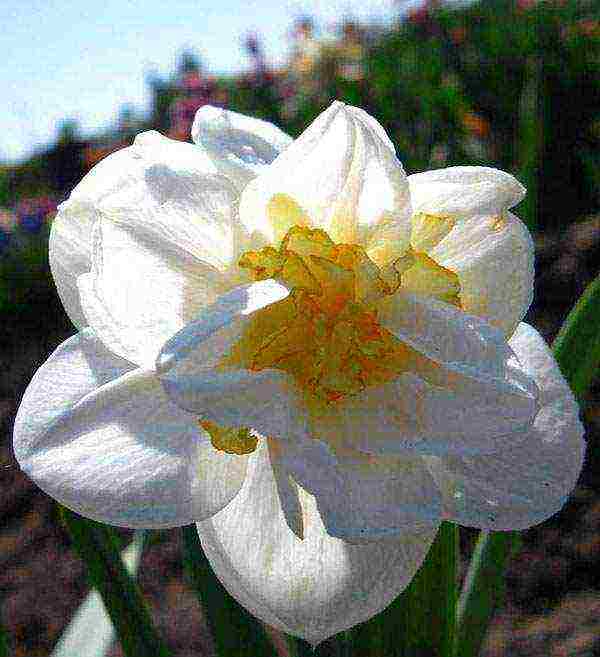 Belongs to the group of terry daffodils. The flower is large in size, has a double crown. The color is white - yellow or pale pink. Narcissus is unpretentious in cultivation. Loves rich and moist soil. Brought from Germany and Italy. The flower has been introduced into cultivation since 1565.Texas is great for group boarding. Suitable for decorating flower arrangements, may not fade for a long time without water when cut.
Belongs to the group of terry daffodils. The flower is large in size, has a double crown. The color is white - yellow or pale pink. Narcissus is unpretentious in cultivation. Loves rich and moist soil. Brought from Germany and Italy. The flower has been introduced into cultivation since 1565.Texas is great for group boarding. Suitable for decorating flower arrangements, may not fade for a long time without water when cut.
Terry daffodil of the Texas variety has an aromatic fragrance during the flowering period from mid-May. When wintering cold, it is better to cover.
Narcissus Ice King
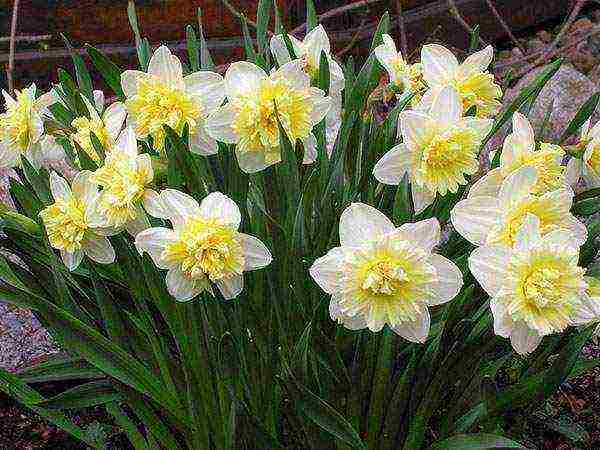 The plant was bred in Italy and has been planted by gardeners since 1850. Narcissus Ice King reproduces vegetatively. The bulb of an adult plant does not exceed 5 centimeters. What does a daffodil look like?
The plant was bred in Italy and has been planted by gardeners since 1850. Narcissus Ice King reproduces vegetatively. The bulb of an adult plant does not exceed 5 centimeters. What does a daffodil look like?
The photo shows the flower family. The plant has wide leaves, located below and at the level of the bud. Each peduncle has one white flower with a light yellow crown. Narcissus Ice King is distinguished by its large flowers, the size of which reaches 11 centimeters.
Grows in abundantly moist soil. Does not tolerate prolonged drought.
Garden plots are ennobled with a flower, it is used in flower arrangements. Narcissus Ice King begins to bloom from the beginning of May. Will delight the gardener with beautiful flowers until the end of the month.
What does a Tahiti daffodil look like?
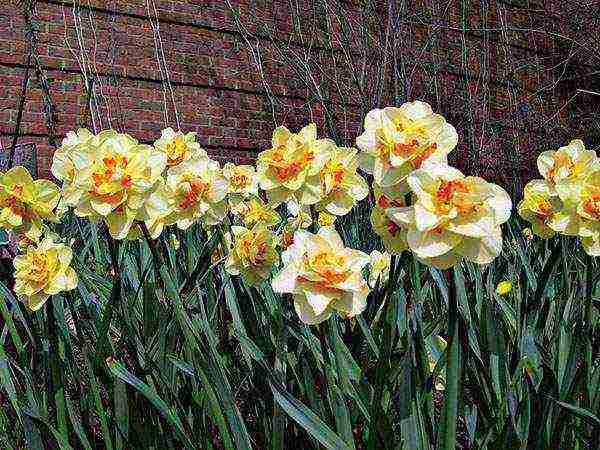 The plant has large double flowers reaching a size of 10 centimeters. The color of the main petals is light yellow. Inside there is a red - orange crown. Narcissus Tahiti grows up to 35 centimeters during the period of active growth. It has narrow dark green leaves that are located below the buds. Each flower has a separate peduncle.
The plant has large double flowers reaching a size of 10 centimeters. The color of the main petals is light yellow. Inside there is a red - orange crown. Narcissus Tahiti grows up to 35 centimeters during the period of active growth. It has narrow dark green leaves that are located below the buds. Each flower has a separate peduncle.
The plant reproduces vegetatively, grows in areas near the house. It tolerates direct sunlight well, loves moist soil. It grows well in groups. It has been actively growing since mid-May. By the end of flowering it fades, but does not lose its pleasant aroma.
Narcissus Replit
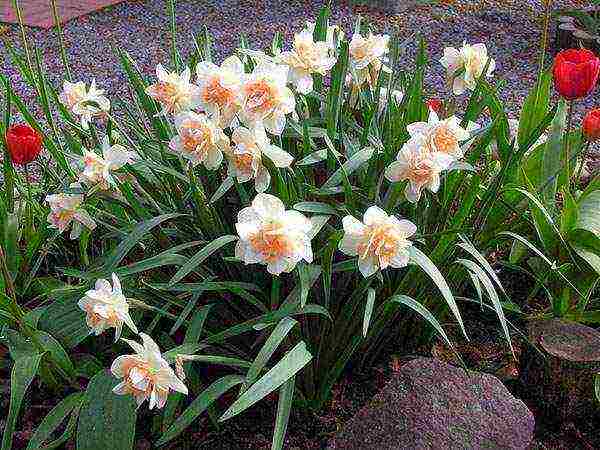 The plant reproduces vegetatively. It tolerates sunlight well and can grow in the shade of trees. The plant has wide leaves of a dark green color, located at the level and below the inflorescences. There can be several buds on one pedicel. Large-sized flowers with light pink petals. Terry crown with peach tint. The plant reaches a height of 50 centimeters. Narcissus Replit is used for landscaping garden plots.
The plant reproduces vegetatively. It tolerates sunlight well and can grow in the shade of trees. The plant has wide leaves of a dark green color, located at the level and below the inflorescences. There can be several buds on one pedicel. Large-sized flowers with light pink petals. Terry crown with peach tint. The plant reaches a height of 50 centimeters. Narcissus Replit is used for landscaping garden plots.
The flower loves richly enriched, moist and loose soil. Used in flower arrangements.
Narcissus Rip Vann Winkle
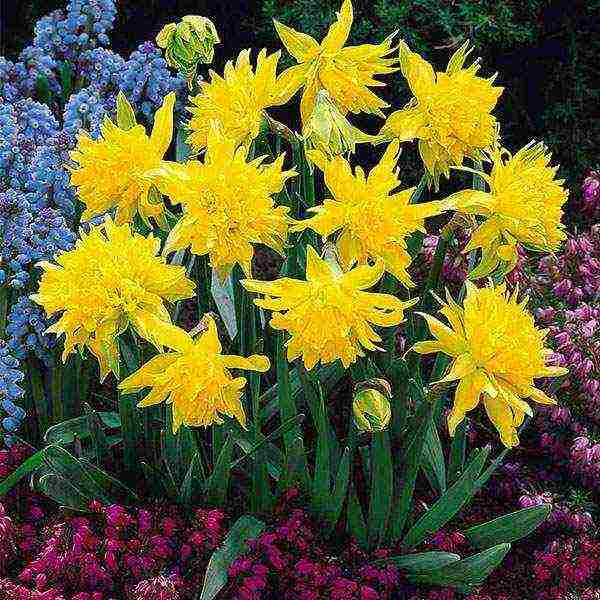 The flower can be located and bloom, being in an open area and in the shade of trees. A low-growing plant, reaching a maximum length of 30 centimeters. It has wide leaves that do not grow to flowers. Narcissus Rip Van Winkle grows in moist and rich soil, does not tolerate drought. Flowers and crowns are double, bright yellow. Each peduncle has a single bud. The plant is dug up after flowering and planted in open ground at the end of winter.
The flower can be located and bloom, being in an open area and in the shade of trees. A low-growing plant, reaching a maximum length of 30 centimeters. It has wide leaves that do not grow to flowers. Narcissus Rip Van Winkle grows in moist and rich soil, does not tolerate drought. Flowers and crowns are double, bright yellow. Each peduncle has a single bud. The plant is dug up after flowering and planted in open ground at the end of winter.
Narcissus Obdam
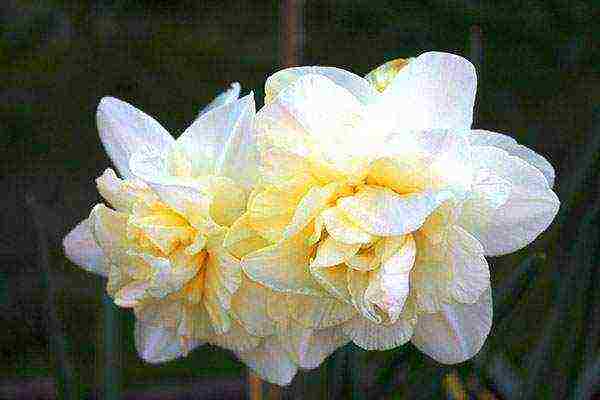 The plant belongs to the terry group. Narcissus Obdam is fragrant with a delicate and refined aroma. Flowers are located on a separate pedicel. They have a delicate beige shade. Large buds. When unfolded, they can exceed 10 centimeters. The plant grows large. At the end of active growth, it can exceed 50 centimeters.
The plant belongs to the terry group. Narcissus Obdam is fragrant with a delicate and refined aroma. Flowers are located on a separate pedicel. They have a delicate beige shade. Large buds. When unfolded, they can exceed 10 centimeters. The plant grows large. At the end of active growth, it can exceed 50 centimeters.
The bulbs are planted in fertilized soil at the end of summer. In early spring, the daffodil Obdam begins to sprout from the ground. In mid-May, the plant pleases others with its appearance. The flowering period lasts no more than 12 days. By the end of this period, the flowers fade to a white hue, but do not lose their delicate aroma. Gardeners are advised to plant tubers in open sunny areas or in the shade of trees.
The tubers of the plant are large enough, up to 6 centimeters. Narcissus Obdam is planted in garden plots in groups.
Interesting about the species and varieties of narcissus - video
The first spring flowers bring us joy after the long winter months.Spring will pass, summer will pass, followed by golden autumn, winter will come, and again we will look forward to spring, which will come to us with the flowering of galanthuses, crocuses, scillas, muscari, tulips, hyacinths and daffodils. A special and honorable place, in my opinion, among spring flowers is occupied by daffodils, because of all of the above, only hyacinths still have a strong aroma, but they are quickly depleted without proper care on poor soils - unlike daffodils, which manifest themselves as true Spartans.
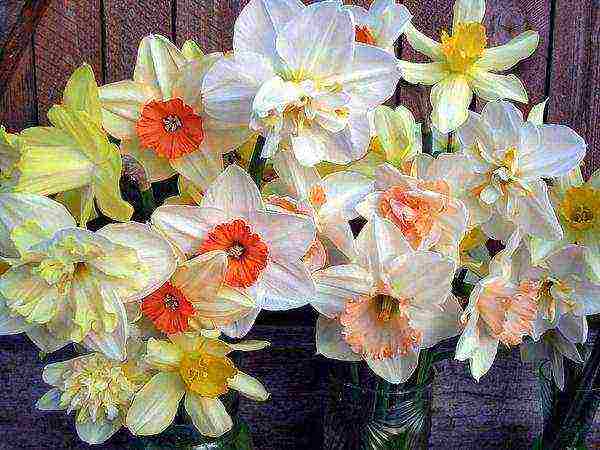
What could be better than daffodils? No matter how good the tulips are, but the mice, systematically destroying the collection being created, at one time cooled my interest in them, and in recent years, new varieties of tulips (mostly botanical) only occasionally and selectively come to my site. And daffodils do not attract the attention of rodents and only grow from year to year. Although it is recommended to dig them up and plant them in 4-5 years, I am in no hurry to do this, and then they bloom, resembling bouquets scattered throughout the garden.
Only once - in the spring of 2003 - after severe and prolonged frosts in the absence of snow cover, some severely affected daffodils did not bloom, but then they recovered. The autumn of 2006, which was unusually prolonged for several months, also influenced the flowering of daffodils, but mainly only some of the varieties planted that fall were affected. They woke up ahead of time and suffered from frost, and the growing ones did not succumb to provocations for several years and waited for spring.
Daffodils can decorate the garden almost a month and a half, if you skillfully select varieties of different flowering periods. But in cut bouquets, they are short-lived, especially in rooms with dry air and high temperatures, but this drawback is inherent in all primroses. Their main purpose is to delight us in the spring garden.
I want to draw your attention to some very worthy varieties of daffodilsthat bloom in my garden and in the gardens of my friends. During the preparation of the article, it turned out that most of them were marked Royal Garden Society (RHS) in different years with a special award for garden merits (Award of Garden Merit) and are recommended for gardeners.
I want to start with quite rare in our garden miniature varieties, since they are the ones who open the daffodil flowering season. My cute crumbs are the first to bloom - cyclamen daffodil'Tete-a-Tete' (RHS, prize-winner 1993), which got its name from the fact that this variety usually has two flowers on one stem.
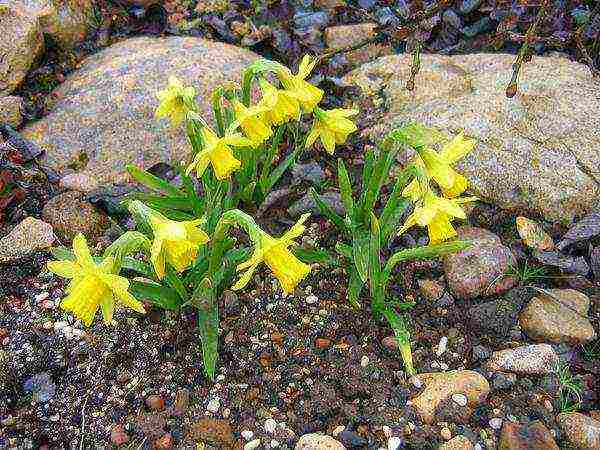
Daffodil cyclamen 'Tete-a-Tete' In my first flowering, I honestly did not like these non-standard dwarfs about 10-15 cm tall, and only the next year I realized that they are also good for the garden, look good next to conifers and can be located on alpine slides.
After the flowering of this baby, ordinary tubular yellow daffodils of an unknown variety begin to bloom. There are so many of them that I began to be drawn to daffodils of other colors. This is how the tubular daffodil variety appeared in the garden 'Spellbinder', bred in the 1940s, is a multiple winner of exhibitions, with unusual greenish-yellow colors.
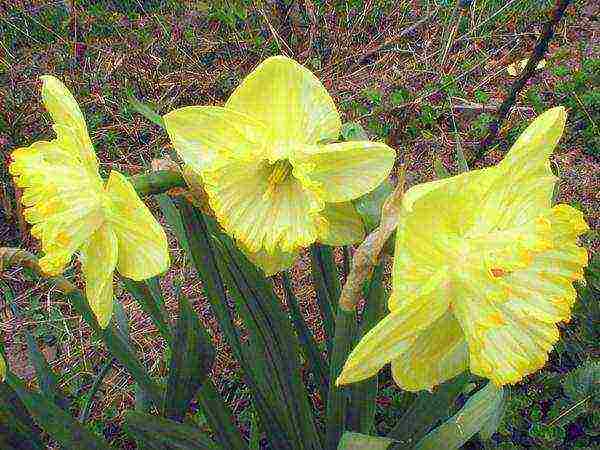
Tubular daffodil 'Spellbinder' Among the tubular daffodils, there is another, far from novice, but an interesting variety - the chameleon 'Mount Hood' (RHS, medalist 1995). Those who dream of snow-white flowers acquire it from pictures or from the hands of grandmothers in the last stage of flowering, when the tube turns from yellow to white, and next spring they do not immediately find that “snow-white” beautiful daffodil.
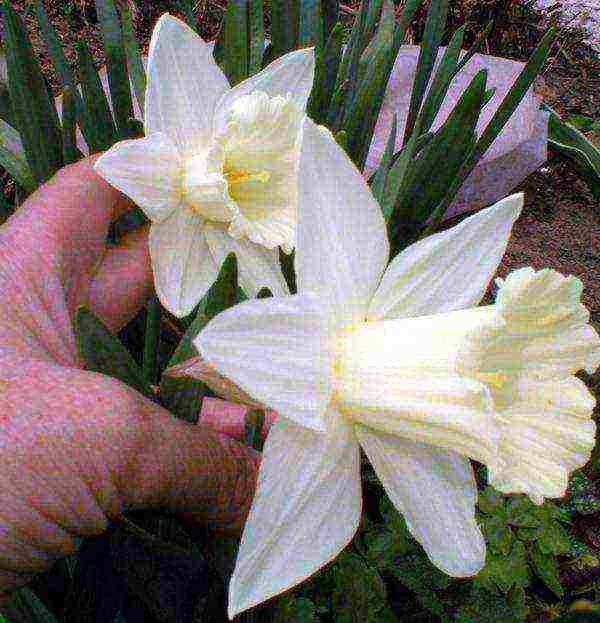
Tubular daffodil-chameleon ‘Mount Hood’ But the purely snow-white graceful and unusually touching daffodil exists! This is the grade ‘Thalia’, which can have about three flowers on each stem.I have it only since last autumn, but from my friend I heard that this variety does not reproduce very well in her, so I will still be watching him.
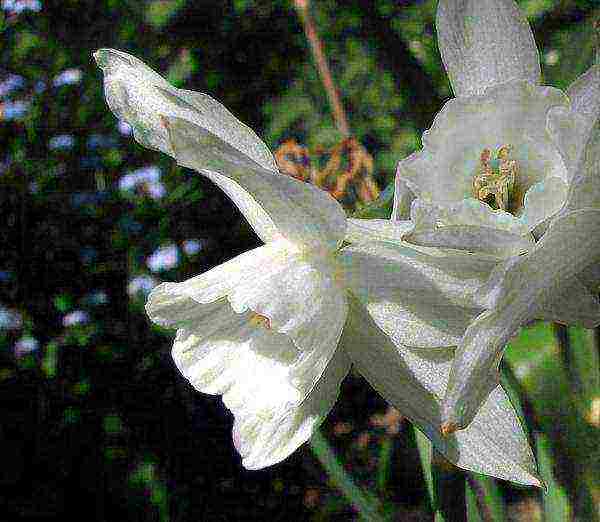
The 'Thalia' daffodil is distinguished by its exquisite whiteness and graceful flower shape. Tubular daffodils are usually very fragrant, but daffodils of other forms can be no less fragrant, among which the large-crowned ones are especially attractive. An excellent representative of large-crowned daffodils - a fairly common variety 'Ice Follies' (RHS, 1993), developed by breeders of the famous Dutch company Konijnenburg & Mark. Snow-white petals surround a wide corrugated chartreuse yellow crown that gradually turns white.
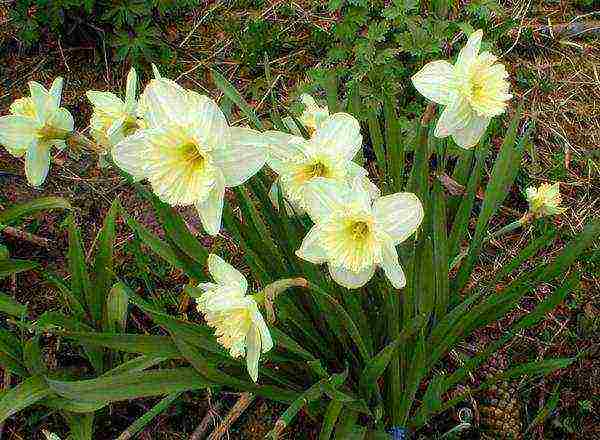
Narcissus large-crowned 'Ice Follies' This variety has a viable terry form - variety ‘Ice King’... He has such stuffed heads that sometimes after rain they can break from their weight. I had no problems with this variety, but in some other later terry varieties, in the absence of watering and rain, the flower embryos dried up right in the unopened covers.
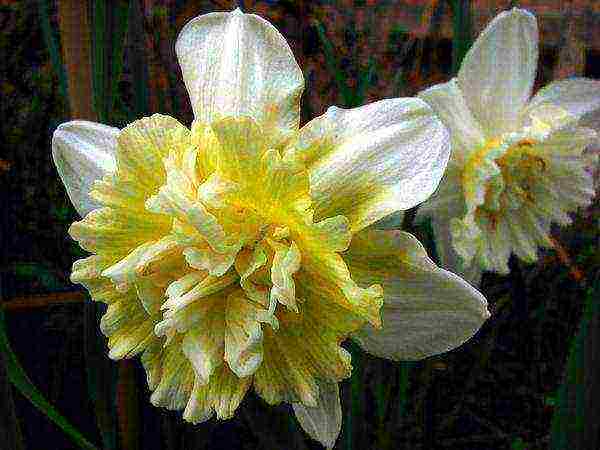
Large-crowned daffodil ‘Ice King’ For a long time, white and yellow colors prevailed among the shades of daffodils, but now there has been a breakthrough, and many varieties with pink crowns have appeared. You can even find a dozen varieties, in the name of which it is directly indicated - Pink or Rosy, which means "pink" in translation.
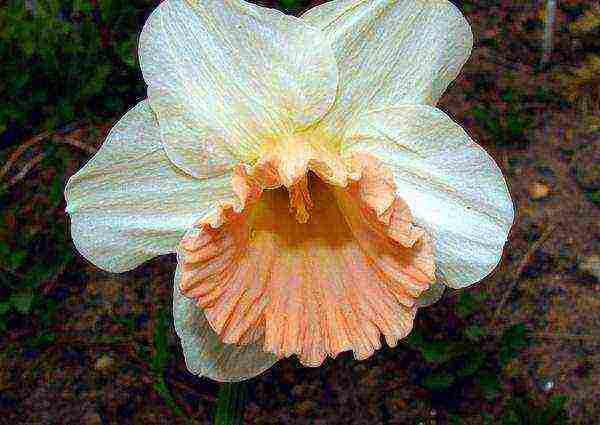
Narcissus tubular ‘Pink Parasol’ Truly pure pink crown, regardless of the stage of flower development, has a tubular variety ‘Pink Parasol’, but his growth is small. Terry and ‘Ice King’ varieties ‘Rosy Cloud’ light pink tightly knit terry crown.
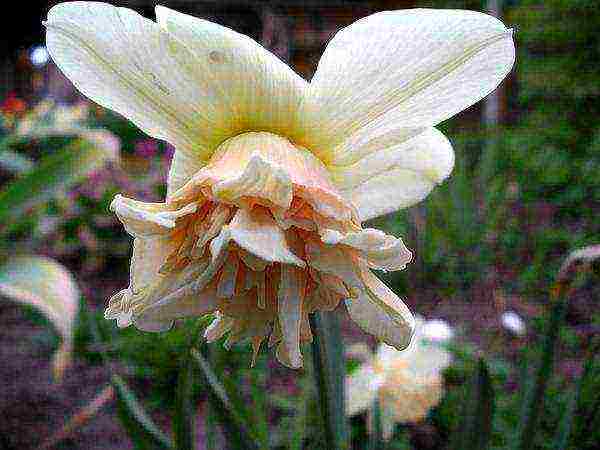
Terry daffodil 'Rosy Cloud' The large-crowned variety is also referred to as pink 'Precocious' (RHS, 2001), although its corrugated crown is more salmon-colored. This variety is considered one of the most attractive.
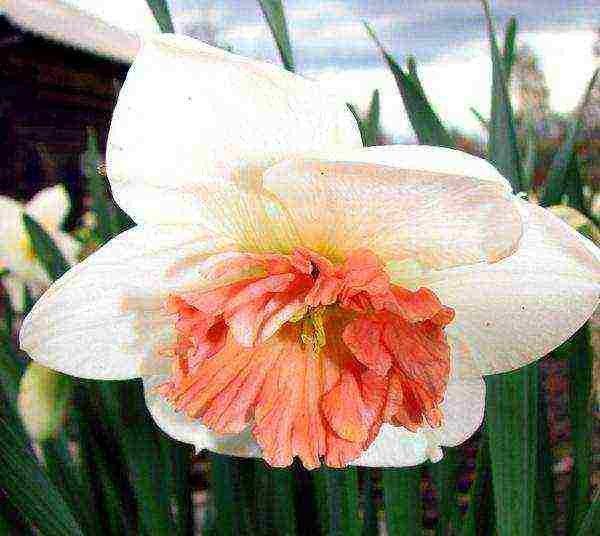
'Precocious' large-crowned daffodil In my opinion, the variety with an unusually bright coral-orange crown can compete with it in attractiveness - 'Chromacolor' (RHS, 2001). There is little grace in it, but a lot of attractive power.
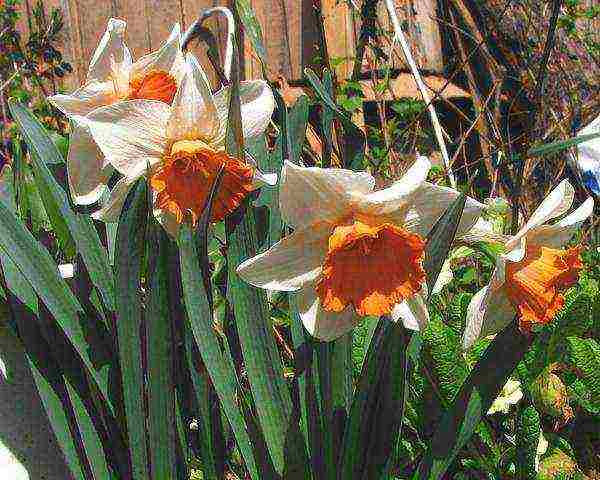
Narcissus ‘Chromacolor’, perhaps, does not amaze with grace, but attracts with its power Among terry and pink varieties, very interesting varieties have appeared, the middle of the flower in which resembles somewhat multilayer lace, like in the variety 'Replete'.
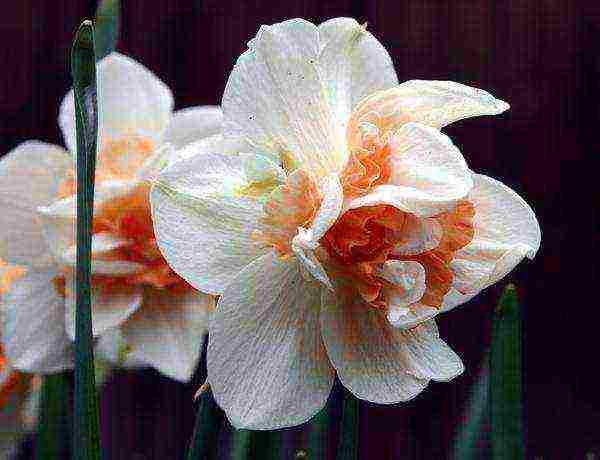
Narcissus ‘Replete’ There are also such varieties in which only some part of it is painted pink, like the small-crowned 'Spring Pride', in which only the crown of the crown is painted.
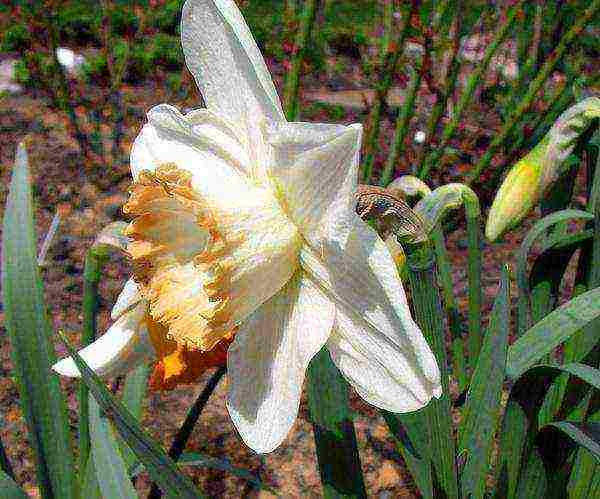
Small-crowned daffodil 'Spring Pride' If there are a lot of pink daffodils now, then there are still few varieties with a light green shade of the flower. Therefore, fans of old daffodils, the so-called "poetic" ones that bloomed in the gardens of our grandmothers and great-grandmothers and are distinguished by a magnificent aroma, will be interested to know that this group has a touching and graceful variety with a slightly caught light green tint even on the petals - the variety 'Mint Julep' (RHS, 2005).
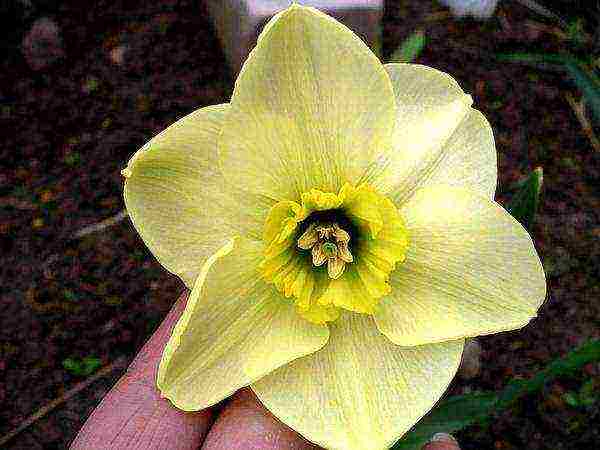
Poetic narcissus 'Mint Julep' I would also like to mention the chameleon variety from the split-crown group with an intriguing name - 'Changing Colors'... Unfortunately, it is not always possible to catch all three stages, when the flower crown changes its color, but photos of two stages of one flower were taken.
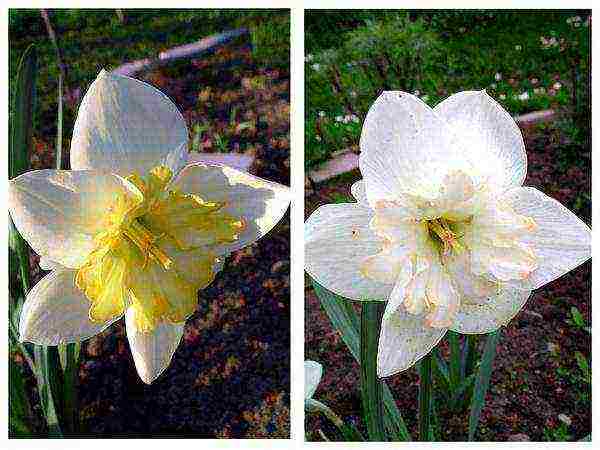
Chameleon daffodil ‘Changing Colors’ - two of three stages of color change When the stores start selling spring bulb flowers again, I’m sure that again I will not be able to resist some of the new products, as I always want something new and beautiful in a spring garden. And what could be better than fragrant and touching daffodils?
Natalia MandrikoDaffodil lovers may also be interested in other publications about these wonderful flowers:
- The most popular varieties of tubular and large-crowned daffodils
- The most popular varieties of Jonquillia, tacetaceous, poetic, wild, Cantabrian daffodils
- The most popular varieties of small-crowned, terry, triandrus, cyclamen-shaped daffodils
- 5 secrets of the daffodil flower
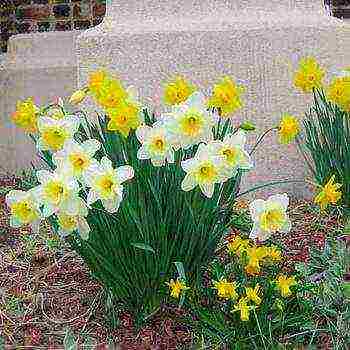 Narcissus is a spring flower, and, unfortunately, you can enjoy its beauty for a very short time (on average, about two weeks).But on the other hand, the bulbs of these plants can remain in the ground for 5-8 years, and without any effort in the spring, your site will again be decorated with small "suns" of daffodils with white or yellow petals and a bright (sometimes even orange) center. And if you have time, you can have time to collect a bouquet of these primroses, and they will stand for a long time in the cut.
Narcissus is a spring flower, and, unfortunately, you can enjoy its beauty for a very short time (on average, about two weeks).But on the other hand, the bulbs of these plants can remain in the ground for 5-8 years, and without any effort in the spring, your site will again be decorated with small "suns" of daffodils with white or yellow petals and a bright (sometimes even orange) center. And if you have time, you can have time to collect a bouquet of these primroses, and they will stand for a long time in the cut.
What daffodils and their bulbs look like (with photo)
Garden flowers daffodils belong to the amaryllis family. There are about 60 known wild species that grow on the Mediterranean coast of Europe and North Africa, as well as in England and Ireland. Daffodils grow in deciduous mountain forests and wet meadows, up to the subalpine belt. In the Carpathians, there is a narrow-leaved daffodil, listed in the Red Book as a rare species.
Many legends have been dedicated to the description of a daffodil flower of an elegant shape with a captivating aroma, poets wrote poems about it. The name of the plant is associated with an ancient Greek myth: the beautiful young man Narcissus saw his reflection in the water and could not tear himself away from it. He died on the bank of a stream out of love for himself. And in this place, an amazingly beautiful flower with a bowed head grew, which people called a daffodil.
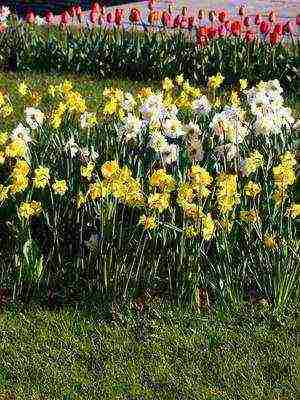
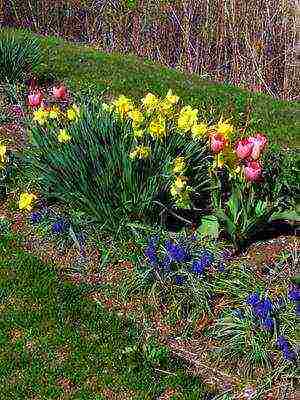
Daffodils look good on flower beds, rabatkas, alpine slides, mixborders, lawns and lawns. Ideal for spring bouquets. Almost all varieties can be distilled.
Daffodils belong to the group of ephemeroids, that is, they grow and develop during the short spring period. In the middle lane, daffodils bloom in late April - May, flowering lasts 1-3 weeks. By July, the aboveground part of the plant dies off, and the bulb remains in the soil. In this way, the plant tolerates an unfavorable period of drought and cold weather.
What does a daffodil look like, so beloved by gardeners and widely cultivated in almost all summer cottages?
As you can see in the photo, the flower in daffodils of most species and varieties is single, it can be located vertically, obliquely or hang freely:
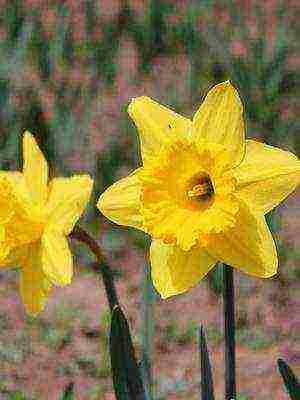
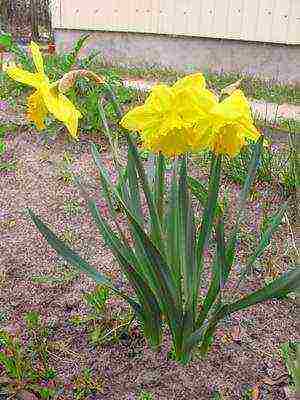
Much less often, at the top of the peduncle, several flowers are collected in an umbrella-shaped inflorescence. The flowers are large to medium in size with a pleasant, sometimes very strong aroma.
The perianth consists of six lobes, petals. The fused outgrowths of the lobes form a crown or tube of different heights, diameters, and shapes. The crown and perianth can be the same color or different. The shape and color of the crown are the main varietal characteristics.
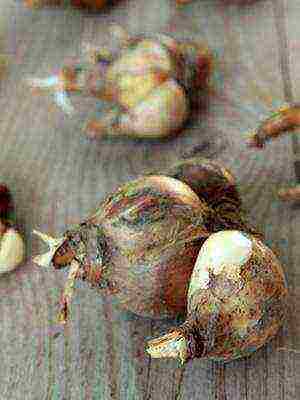
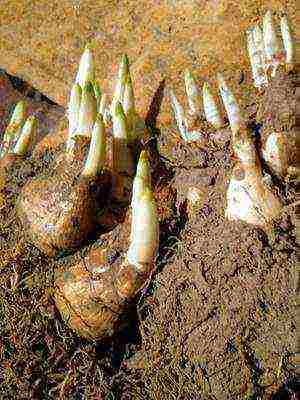
The bulbs of daffodils are perennial. Young, never blooming bulbs are single-peaked, over the years their structure becomes more complicated, they become two - and then three-peaked.
Pay attention to the photo of mature daffodil bulbs - they are large, round or elongated-oval, their shape is often determined by the varietal affiliation:
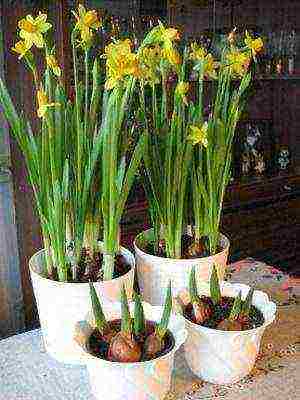
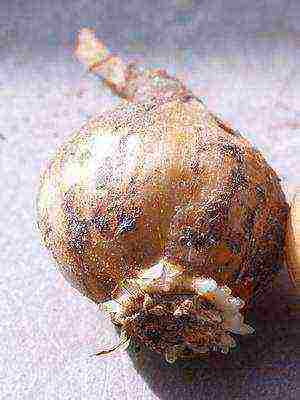
Every year 1-3 babies are laid in the bulb. Renal formation of renewal is completed mainly in 2 years. Narcissus bulbs practically do not have a dormant period, since there is a continuous development of two renewal buds of different ages. This allows the plants to be affected two to three years before flowering.
How to grow and how to care for daffodils
Daffodils are less whimsical culture than hyacinths and tulips. Cultivated soils are best suited. Before growing daffodils, prepare a soil with sufficient humus, good structure and a neutral reaction. For optimal care and cultivation of daffodils, groundwater should lie no higher than 50-60 cm from the surface, otherwise, with heavy rainfall, daffodils will die off the tips of the roots, which will lead to a deterioration in growth. On heavy, moist soils, where excess moisture stagnates in spring and autumn, drainage needs to be arranged. Sandy and heavy clay soils can be improved by adding more humus. Fresh manure is applied a year before planting, and well-rotted manure immediately before it (in this respect, daffodils are not as sensitive as other bulbous ones).
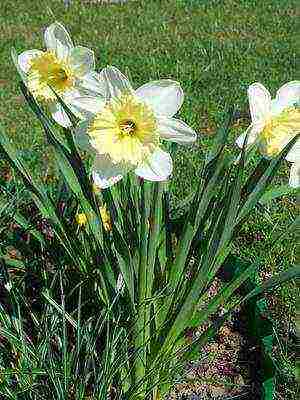
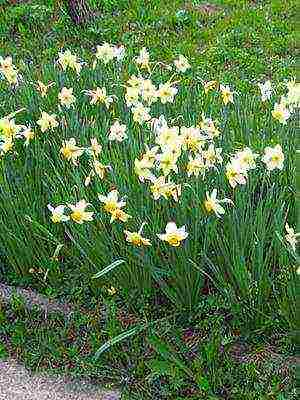
They prefer open, sunny places, but plants can also be planted in partial shade. How to care for daffodils depends on the class of plants: individual groups of these crops have their own characteristics. Cyclamenous are more demanding on moisture. The Zhonkilievs need a lot of sun, they grow better on clay soils. Triandrus trees tolerate shade better and can be grown even on northern slopes. Poetic daffodils don't like the annual transplant.
For successful planting and caring for daffodils, the soil for sowing is prepared in the spring by adding superphosphate (30 g / m2), as well as peat, humus or compost at the rate of 1.5-2 buckets per 1 m2. The soil is dug up to a depth of 30-35 cm and cultivated several times during the summer.
How to plant daffodils: planting and caring for bulbs outdoors
Daffodil bulbs are planted earlier than hyacinths and tulips - in late August or early September. Their dormant period is short, and you need to have time to plant them before root formation. Poetic ones are planted first, then small and large-crowned, the last tubular. The bulbs, planted at the optimal time, have time to develop a powerful root system before frost, as a result of which they tolerate wintering well.
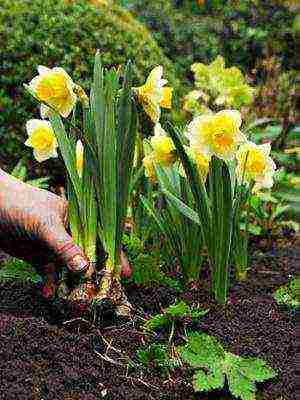
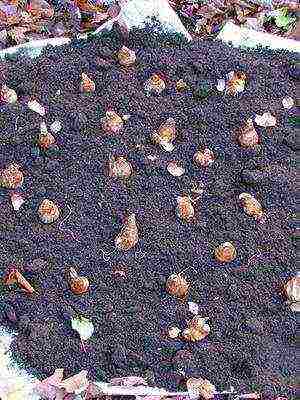
Before planting daffodils, you need to prepare holes with an average depth of 12-15 cm: on heavy soils no more than 12 cm, on light soils - up to 17 cm. Small bulbs and baby are planted to a depth of 10 cm from the bottom. The bulbs are placed at a distance of 7-10 cm from each other, large - 15 cm. When densely planted, daffodil flower bulbs are larger. With a rare planting, more children are formed.
Immediately after planting daffodils in open ground, when caring for them, the bulbs are watered abundantly, the ground is mulched with peat or humus with a layer of 2-3 cm. When the soil is 4-5 cm frozen, daffodils are covered with foliage, straw or chopped reeds. Especially carefully you need to cover the daffodil daffodils, poetic shelters do not require.
In the spring, after the snow melts, the shelter is removed, leaving a layer of mulch, and immediately fertilizing with nitrogen fertilizers is carried out at the rate of 20-30 g of ammonium nitrate per 1 m2. Then, every 10-12 days until the end of flowering, complex fertilizers with microelements are applied.
When caring for daffodil flowers, do not forget that these plants are quite hygrophilous. During the growing season, they are regularly watered, especially in hot, dry weather. A lot of water is required for daffodils after flowering, when the bud of a future flower develops in the bulb. In the middle lane, watering is continued for another 4-6 weeks after flowering. Weekly 2-3 buckets of water are added to 1 m2 of plantings.
Here you can see a photo of caring for daffodils during the growing season and after flowering:
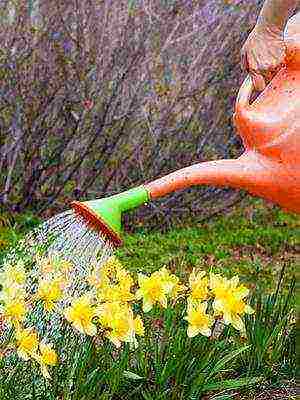
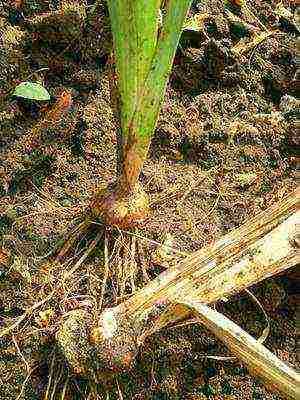
Should you dig up daffodils and how to store the bulbs?
Many summer residents are concerned about the question of whether daffodil bulbs need to be dug up annually or can they be left in the ground? Daffodils can be dug up every year or after 2, 3, 4 years. The bulbs are usually dug up in July, when the leaves have dried up.
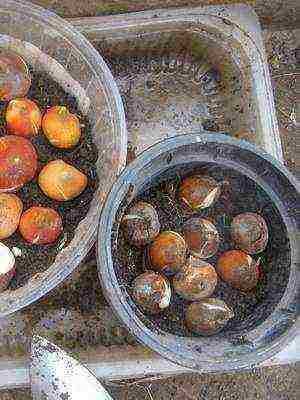
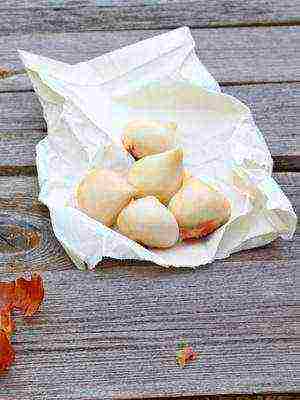
And how to store daffodil bulbs in order to get excellent planting material in the spring? Washed immediately, laid out in one layer in boxes with a mesh bottom. Dry for 2-3 weeks at 20-25 ° C in a ventilated room or under a canopy. Before planting, the bulbs are stored at a temperature of 17-20 ° C and an air humidity of 70-80%.
If the bulbs are not dug up, then after drying, the leaves are removed and the ground is leveled with a rake. In this case, the holes left in the soil after harvesting the leaves will be filled in, which will make it difficult for hoverfly larvae to penetrate the bulbs. In the future, weeds are regularly destroyed. In the second half of August, watering and feeding are resumed.
For more than 5 years without transplanting, you can keep plants on the lawn in free groups resembling natural ones, as well as on an alpine slide. In this case, a very deep planting is used to suppress the vegetative propagation of the bulbs.
To obtain the maximum number of bulbs, an annual transplant is carried out.To this end, immediately after digging, without drying, the bulbs are planted on pre-prepared ridges. The compromise is a two-year crop, which allows you to get a lot of cut and a sufficient yield of bulbs.
Varieties of tubular daffodils with photos and names
Numerous varieties and forms of daffodils are the result of the hard work of many generations of breeders. Work on the creation of new varieties began in the 18th century, and the greatest success has been achieved in our time. More than 12 thousand varieties of daffodils are now known. In 1950, the Unified International Classification of Narcissists was adopted, which distinguished 12 classes (groups).
Below are descriptions of the daffodil plants of each group and their best varieties.
1. Tubular - the crown is long, in the form of a tube, exceeds the length of the petals or is equal to them, the flowers are single, usually large. The height of the peduncle is 30-50 cm, the bulbs are large, reaching 5 cm in diameter. This group of daffodils is one of the oldest, but until now a fifth of the assortment sold are flowers of this class.
Take a look at the photo of what the most popular varieties of tubular daffodils look like:
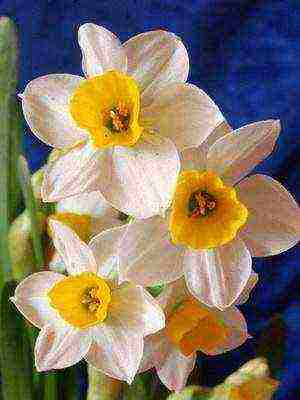
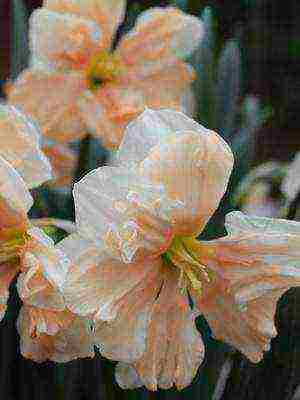
"Victoria". The flower is located vertically, 9 cm in diameter, the lobes are cream, the tube is yellow, cylindrical, with a bent wavy edge, 3 cm high. It blooms from the beginning of the second decade of May. Suitable for cutting, forcing, gardening.
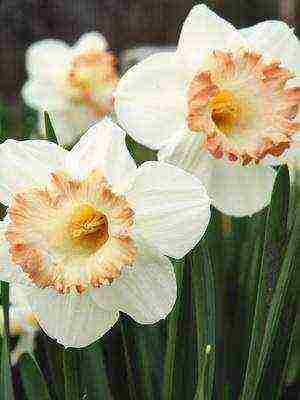
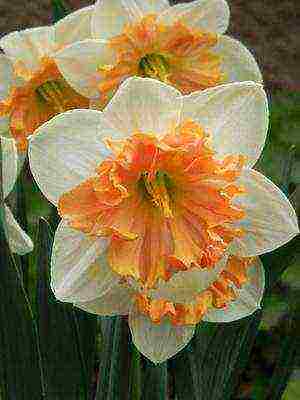
Easter Bonnet.The flower is more than 10 cm in diameter, the perianth is white, the tube is super-corrugated, pink with a border of more intense color.
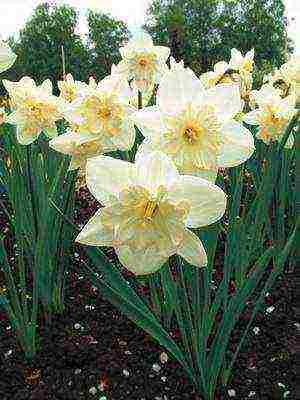
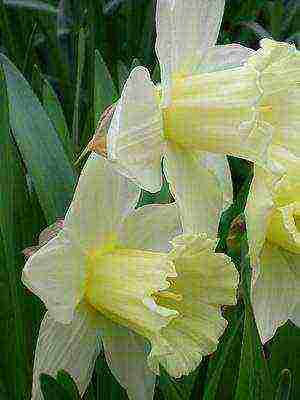
Mount Hood. The perianth lobes and tube are pale cream; over time, the tube changes color to white. The flowers are very large (up to 12 cm in diameter), they remain on the plant from 14 to 19 days, in the cut - 10-12 days. Peduncles up to 40 cm. Plants are resistant to unfavorable weather. The variety has a high multiplication factor.
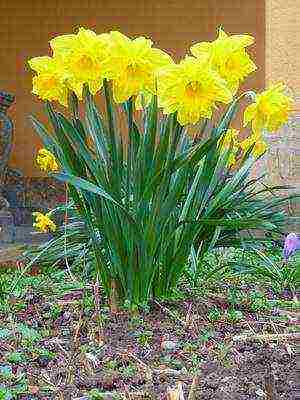
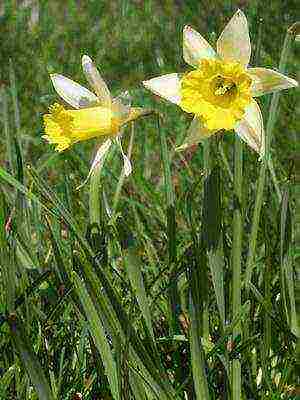
Rembrandt. The flower is large, 10 cm in diameter, of a uniform golden yellow color. The tube is 4 cm high, cylindrical. Peduncle 20 cm, leaves are gray-green, flat. The aroma is weak. Blooms from the second decade of May. Suitable for group planting and forcing.
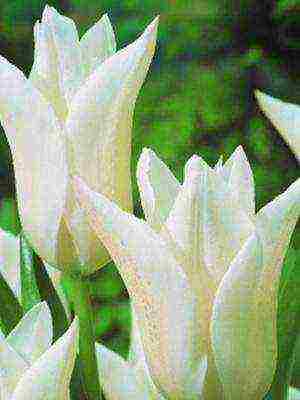
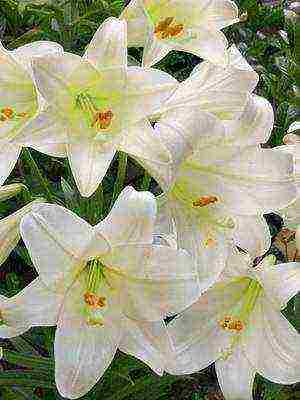
"White Triumphant". The flower is large (10 cm in diameter), pure white. Perianth lobes are pressed to the tube. The tube is 5 cm high with a fawn tint. The edges of the tube are notched and corrugated. Blooms in May. Suitable for cutting and flower decoration.
Varieties of large-crowned and small-crowned groups of daffodils
Here you can see the photos and names of varieties of daffodils of the large-crown and small-crown groups.
2. Large-crowned - tubular or funnel-shaped crown, more than 1/3 of the length of the petals. Daffodils of this class are highly decorative, among them there are varieties with a pink color. Their peduncles are longer than those of tubular ones, which makes them indispensable in bouquets. Currently, varieties of large-crowned daffodils are in the greatest demand.
Popular varieties:
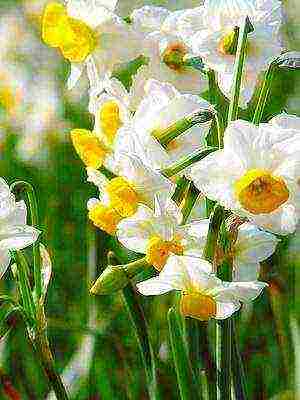
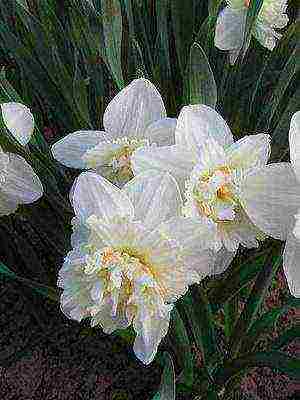
Confuoko. The flower is large, 12 cm in diameter, creamy yellow. The crown is large, yellow, orange at the edges, 4.5 cm in diameter, 2.5 cm high. Plant height is 50 cm. It blooms from the end of April. The use is universal.
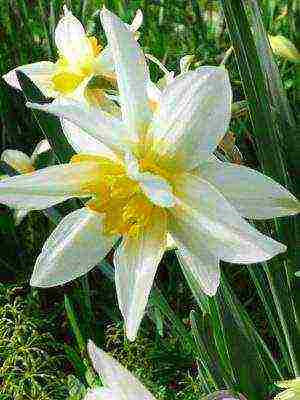
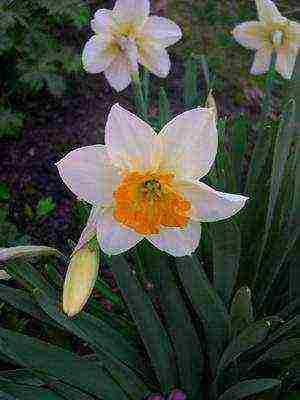
Orange Monarch. The flower is large, 10 cm in diameter, the perianth lobes are white, rounded, the crown is bright orange, wide (4.5 cm), with a wavy edge. Peduncle about 30 cm. The aroma is good. Blooms from mid-May. Suitable for cutting and forcing. A very showy variety.
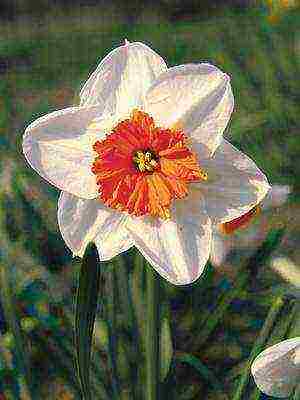
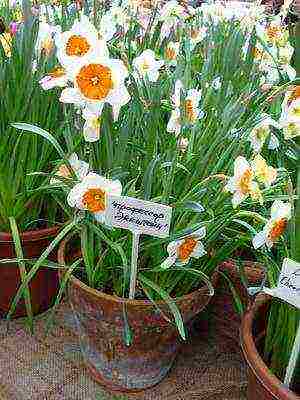
"Professor Einstein". The flower is large, 9 cm in diameter. The petals are white, rounded. The crown is low, only 0.8 cm high, 4.5 cm in diameter, dark orange, corrugated. The height of the peduncle is 40 cm. It blooms at the end of May. Suitable for cutting and flower decoration.
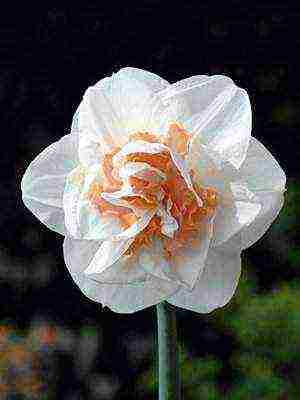
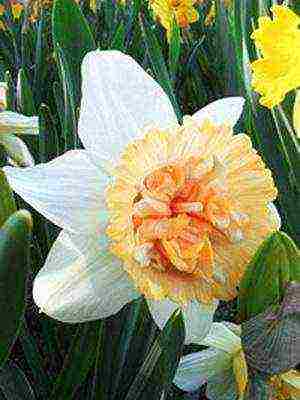
Champagne. The crown is creamy pink in the form of a wide semi-tube. The stem is strong, high (50-60 cm). Blooms in the third decade of April.
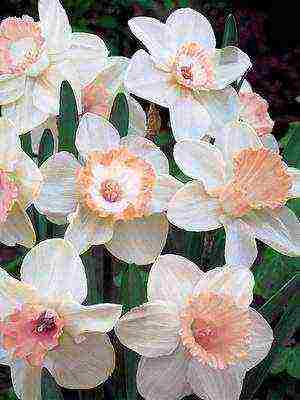
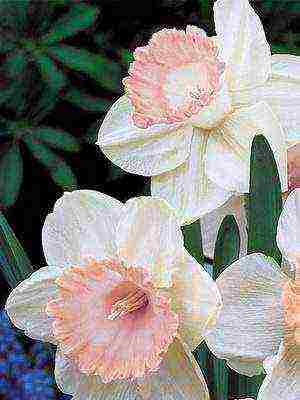
Lady Bird. The crown is pink, conical. Plant height 40-50 cm blooms in late April - early May.
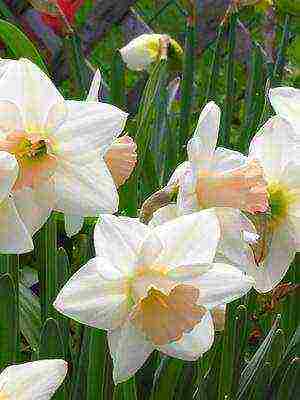
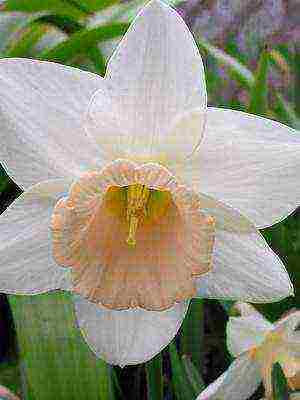
Pink Glory. The crown is pure pink, tubular. Possesses a strong pleasant aroma. Plant height 40-50 cm blooms in late April - early May.
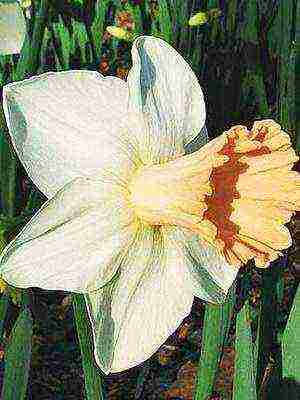
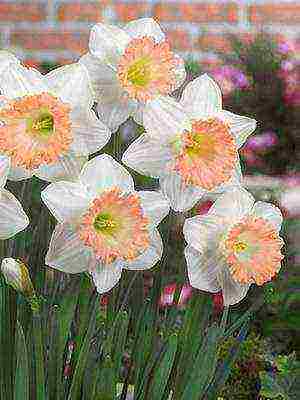
Rosie Sunrise. The crown is creamy pink, funnel-shaped, strongly corrugated along the edge. Plant height 40-50 cm blooms in late April.
3. Small-crowned - crown no more than 1/3 of the length of the petals, often with an orange edging. The petals themselves are often rounded, the flowers are rather large. The peculiar flavor gives this class of daffodils a special charm. Bloom later than the first two groups. They are not widely used.
The following varieties are widely known:
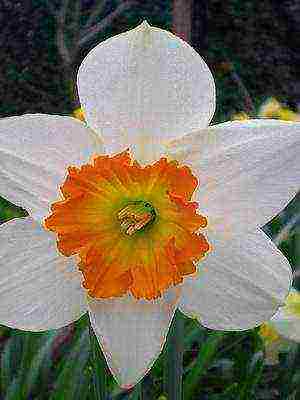
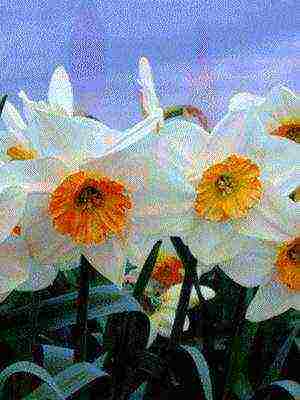
"Amor". A flower up to 11 cm in diameter has slightly creamy petals that fade over time and turn white. The crown is 2.5 cm high, 5.5 cm in diameter, yellow with an orange border, in the form of a wide bowl with a corrugated edge. Peduncle up to 40 cm high. The average flowering period, flowers last 18-22 days.
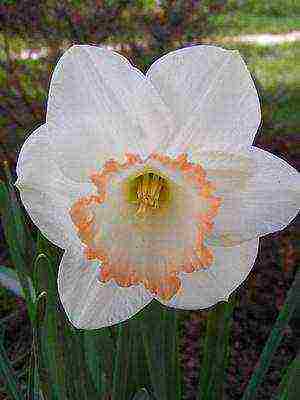
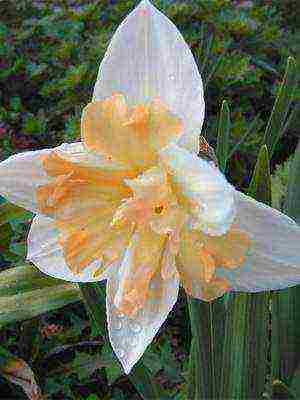
Epicote Distinction. Flower up to 8 cm in diameter. The petals are white, smooth, the crown is orange, apricot to the edge, wavy, 1.5 cm in height and 2.5 cm in width. The aroma is pungent. Blooms in the second half of May. Suitable for cutting and group planting.
The best varieties of the terry group of daffodils
4. Terry - this includes varieties of a very different structure and origin with double flowers, bloom simultaneously with small-crown ones. Peduncles are low - 25-30 cm, which limits their use in bouquets.
The best varieties of terry daffodils:
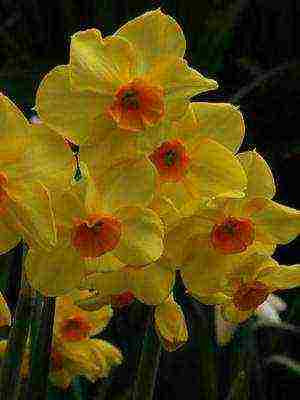
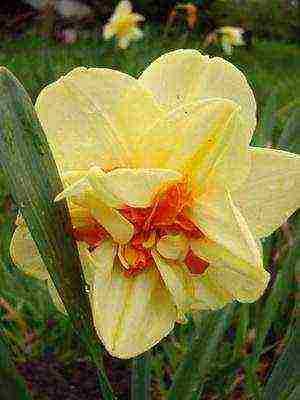
Gay Challenger. A flower up to 10 cm in diameter with a white double perianth and an orange-red double crown. Late. Great in cut.
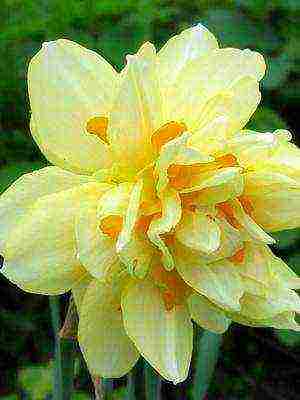
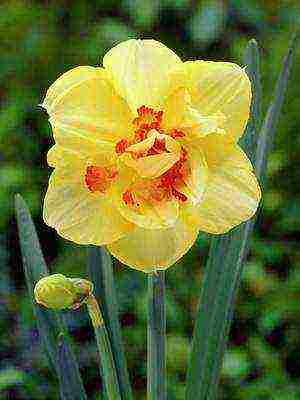
"Texas". Large double flower, 9 cm in diameter. Greenish-yellow lobes interspersed with narrow orange ones. The aroma is strong. Blooms from mid-May. Suitable for cutting, forcing and group planting.
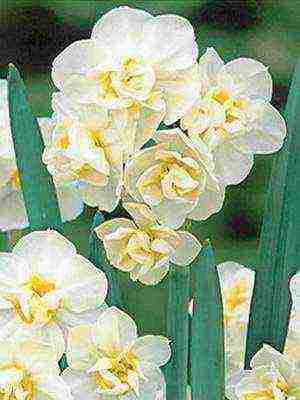
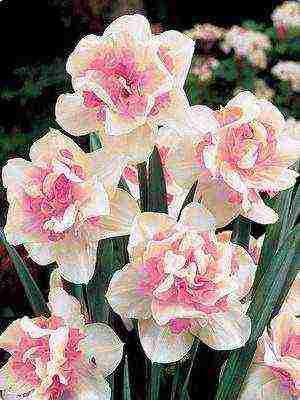
Chirfulness. On the peduncle there are 3-4 flowers up to 4 cm in diameter. The outer lobes are rounded, white, the inner ones are smaller, white, interspersed with creamy yellow outgrowths of the crown. The aroma is good. Peduncle 30-35 cm high. Blossoms from the twenties of May. The variety is suitable for cutting, forcing.

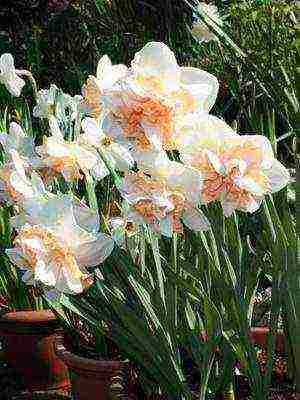
Twink. A flower with delicate apricot-pink petals. The height of the peduncle is 40-45 cm. It blooms in late April.
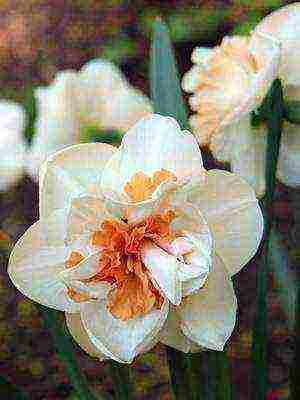
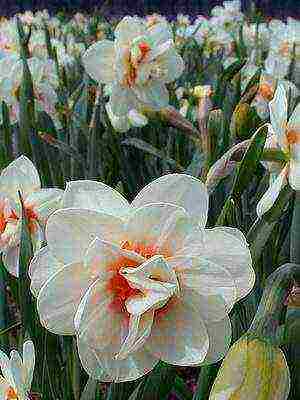
Pink Paradise. Flower (9 cm) with white double perianth, double crown, orange-pink. Late. Suitable for cutting and gardening.
Trindrus daffodil varieties
5. Triandrus - flowers are collected in umbellate inflorescences of 2-4 pieces on one peduncle. Plant height up to 30 cm. Not widely used, however, in amateur gardens, especially terry forms are in demand.
The best varieties of daffodils in this group:
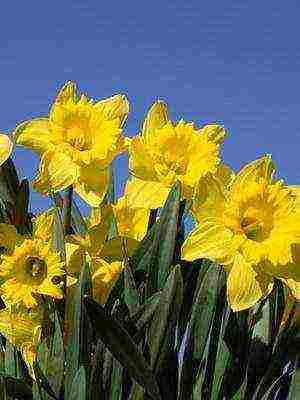
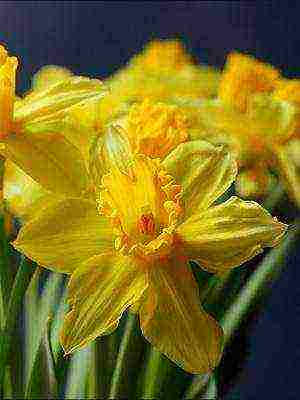
Jet Phase. Flowers with turned-back petals, yellow. The crown is orange-red with a wavy edge, large. Plant height up to 30 cm. It is used for cutting, flower decoration.
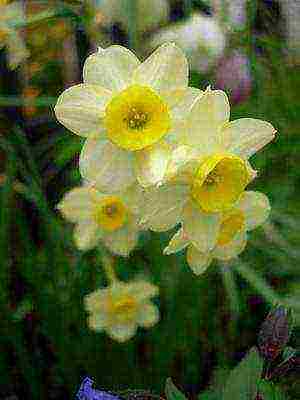
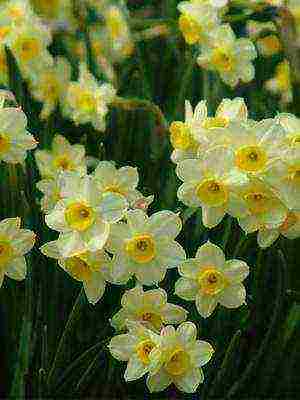
Minow. The flowers are drooping, creamy white, the tube is large, yellow, with a wavy edge. Plant height about 20 cm. It is used for rocky hills.
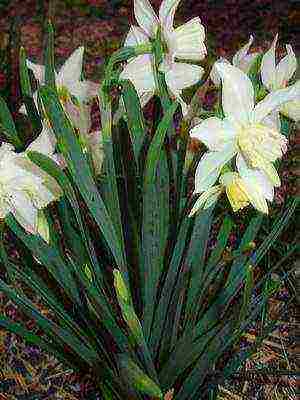
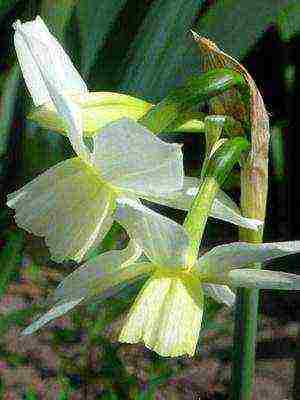
"Waist". There are two flowers on the peduncle. The petals are narrow, white, slightly bent back. The tube is long white. The aroma is weak. Plant height 20 cm. It is used in group plantings, for forcing in pots.
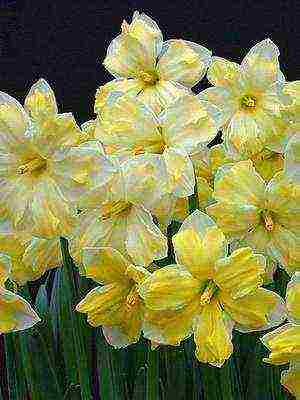
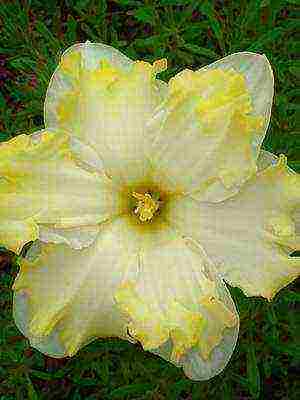
"Title Tettle".The flowers have light yellow petals and a crown. The plant is strong, with several flowers on the peduncle. Height about 30 cm. It has a pleasant aroma. Suitable for cutting and garden design.
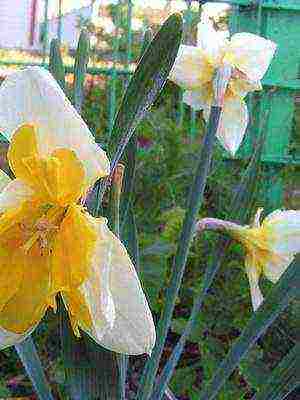
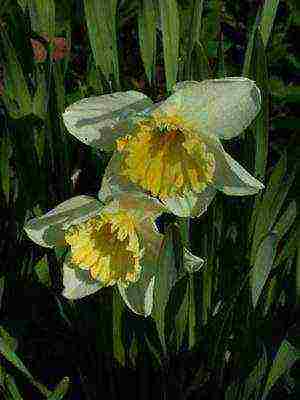
Tresumble White. There are 2 flowers on the peduncle. One is large (up to 8 cm in diameter), the other is smaller. The lobes are white, bent back. The crown is white, cylindrical, with a wavy edge, 2.5 cm high and 3.5 cm wide. The aroma is pleasant. Blooms in the second half of May. The variety is weakly winter-resistant, sometimes the buds freeze slightly. Suitable for cutting and group planting.
Here are photos of varieties of trindrus class daffodils:
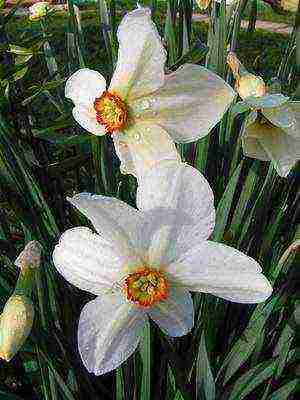
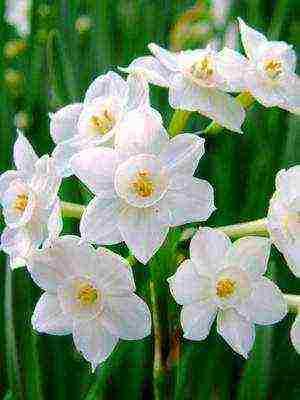
Cyclamen-like, Jonquillian and tacetal groups of daffodils
6. Cyclamen - come from the cyclamen narcissus. Flowers with a long crown and strongly bent back petals. This shape makes them look like a cyclamen. The earliest flowering time.
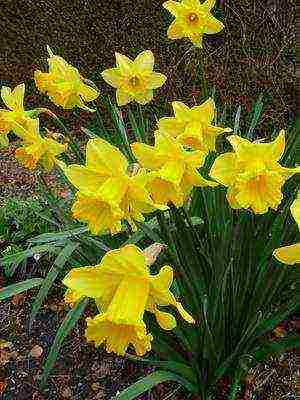
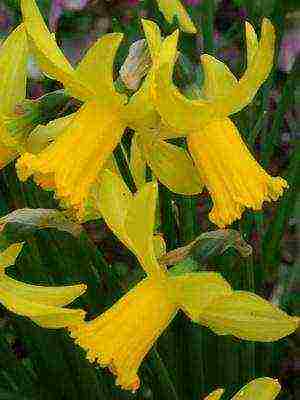
The most famous variety February Gold. The flowers are drooping, the petals are bent back, golden yellow, the crown is darker, longer, with a wavy edge. Peduncle height up to 20 cm. It is used in flower decoration and for cutting.
7. Jonquilliae - originate from the narcissist Jonquilla. On the peduncle there are 2-3 very fragrant flowers. The perianth lobes are elongated, the crown is goblet, whole, shorter than the petals.
The following varieties are most popular:
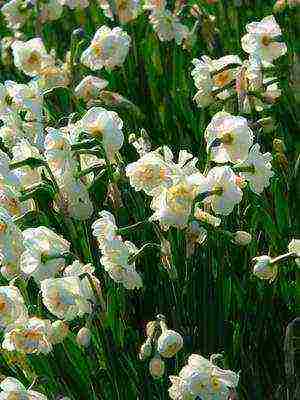
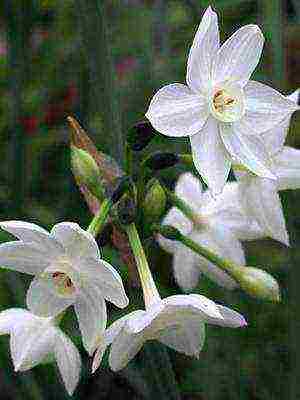
Cherie. The flower (7 cm) is graceful, delicate, fragile with a white perianth and a creamy pink crown. Late. Great in cut.
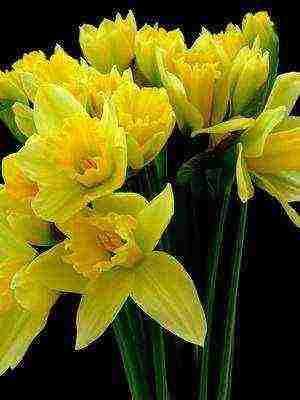
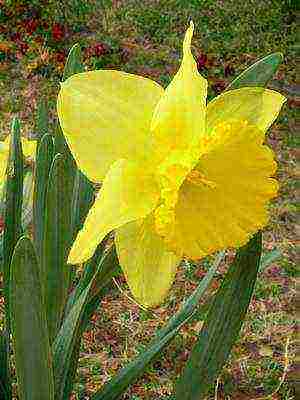
Golden Scepter.On the peduncle there are 2-3 flowers up to 4 cm in diameter. The lobes are horizontally spread, rounded, yellow. The crown is cup-shaped, 1.5-2 cm high, yellow. The aroma is good. Blooms in early May. Suitable for cutting as well as group planting.
8. Tacetnye - the group is obtained from crossing various varieties with the daffodil Taceta (bouquet). The flowers are medium-sized, fragrant, 3-8 on one peduncle, the crown is less than 1/3 of the length of the petals. These daffodils are hardy.
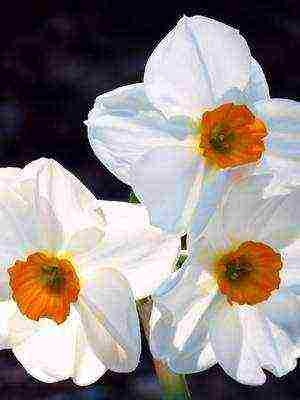
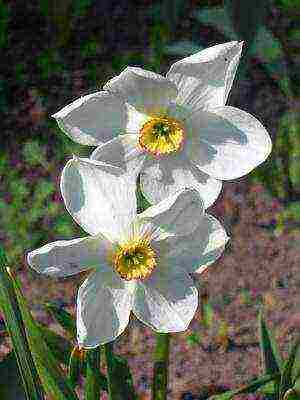
Known variety Geranium. The flowers are medium-sized (up to 5 cm in diameter), collected in an inflorescence of 3-5 pieces. The perianth petals are white, the crown is flat, bright orange. Peduncles about 30 cm high. Flowers last 9-20 days on a plant and 10-12 days in cut. The variety is suitable for forcing and gardening.
Poetic and wild-growing daffodil classes
9. Poetic - originate from the poetic narcissist, from whom they inherited white fragrant single flowers. The crown is short, yellow, with a bright orange rim.
The most popular varieties of the group:
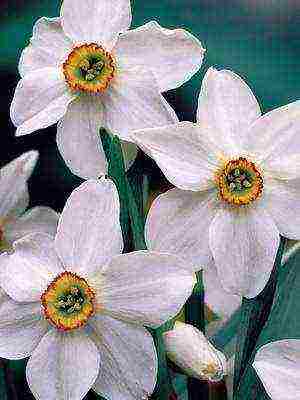
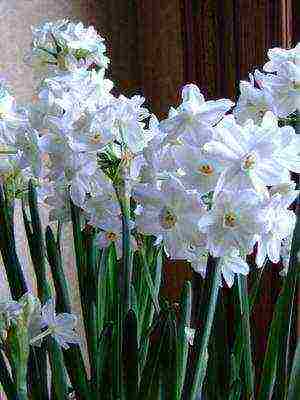
"Akteya". Fragrant flower up to 9 cm in diameter, white, yellow crown with a red border. Peduncle height up to 50 cm. It blooms from mid-May. Suitable for cutting and group planting.
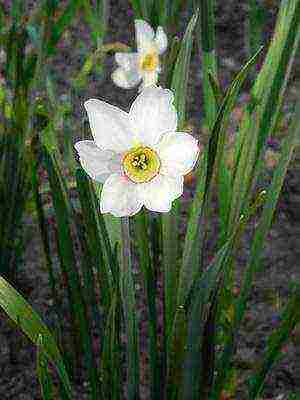
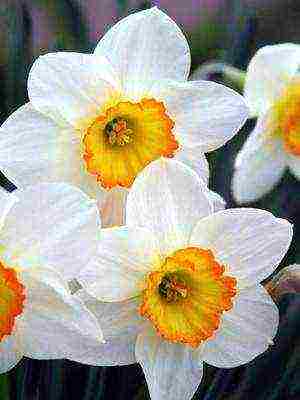
"Horace". The flower is 8 cm in diameter, the lobes are white, smooth, densely overlapping each other. The crown is corrugated, yellow with a bright orange edge. The aroma is very pleasant. Blooms from the twenties of May. It is used for cutting, forcing and group planting.
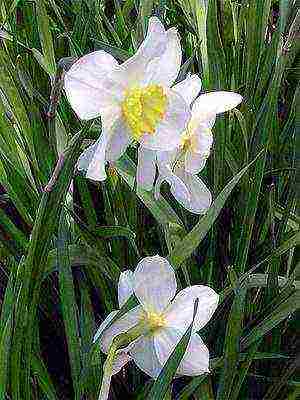
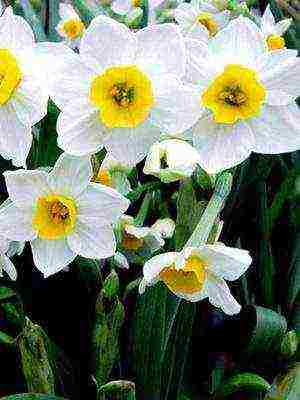
Dante. The flower is 6 cm in diameter. The lobes are white, rounded. The crown is yellow with a yellow-orange jagged edge. The aroma is good. It blooms in the third decade of May. The variety is over a hundred years old, but it still hasn't lost its significance.
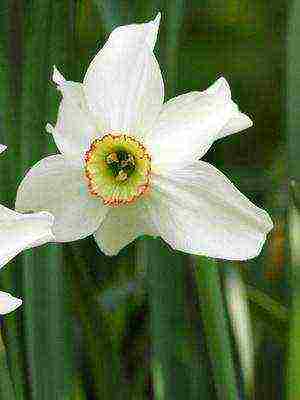
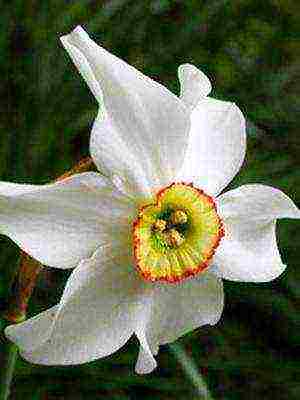
Red Rome. The flower is 5 cm in diameter. The lobes are round, folded, white. Light orange crown with red edging. It blooms on the twentieth of May. Suitable for cutting and group planting.
10. Wild species, their forms and natural hybrids - this group is used for making slides and breeding work.
The most commonly grown varieties are:
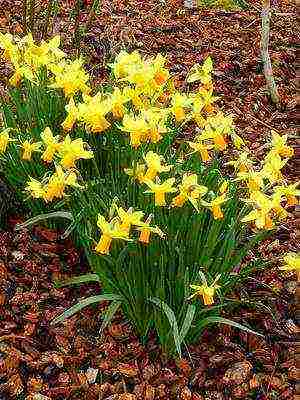
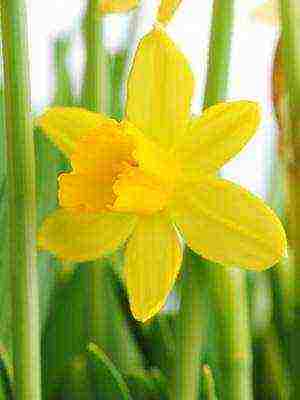
"Obvalaris Salisbari". The flower is horizontally located with a diameter of about 7 cm. The perianth segments are light yellow, ovoid, smooth. The crown is bright yellow, cylindrical, with a wavy edge 3.5 cm high, 2.5 cm in diameter. It blooms from the beginning of May. The aroma is weak. Suitable for group plantings.
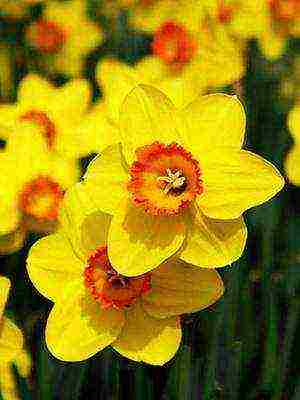
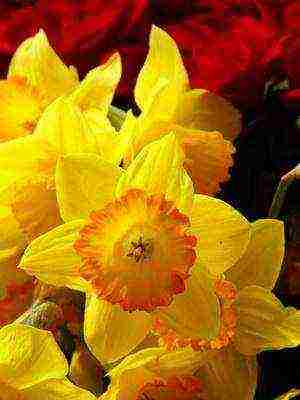
Ornatus Maximus. The flower is vertically located with a diameter of 8 cm. The perianth segments are white, smooth, elliptical. The crown is yellow-orange, bowl-shaped, 0.3 cm high, 1.5 cm in diameter. It blooms from the second decade of May. The aroma is strong. Suitable for group plantings.
The best varieties of the split-crown group of daffodils
11. Split-crown - have an original, split into several parts (usually 6) crown. The height of the peduncles, depending on the variety, ranges from 25 to 50 cm, the diameter of the flower is 7-11 cm, the diameter of the crown is 2.5-10 cm. Currently, this group of daffodils occupies a special place due to the variety of flower shapes.
According to the shape of the crown, 3 subgroups are distinguished:
1) the crown fits snugly against the petals;
2) does not adjoin the petals along the entire length, the lobes are curved, notched along the edge;
3) resembles a six-rayed star with narrow lobes.
Varieties:
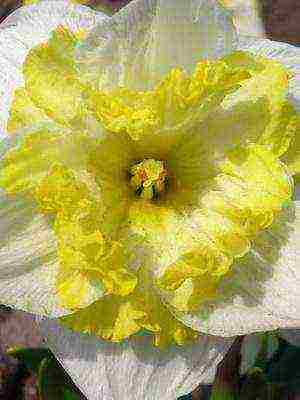
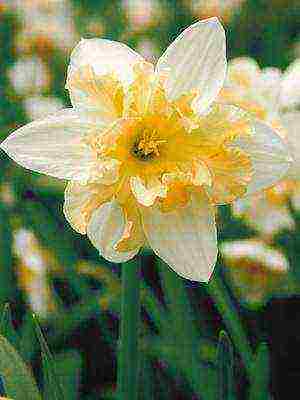
"Printl". The flower is 11.5 cm in diameter, the perianth is white, the crown is yellow with an unusually beautiful "curly" (fringed) edge. The flower resembles an orchid in shape.
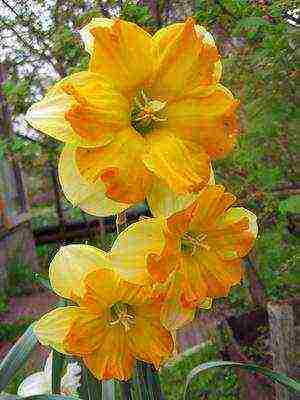
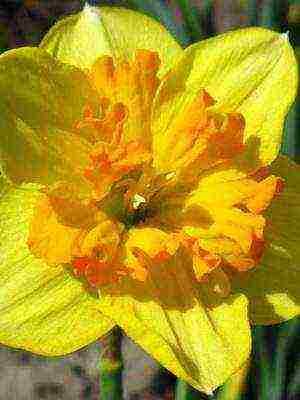
Mondragon. A flower 10.5 cm in diameter with a bright yellow perianth, a dark orange crown, corrugated. Medium, versatile.
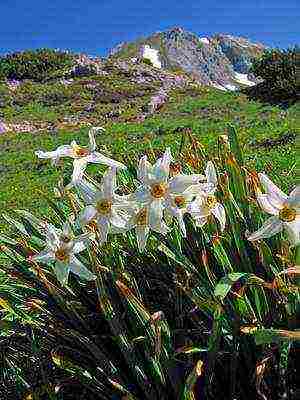
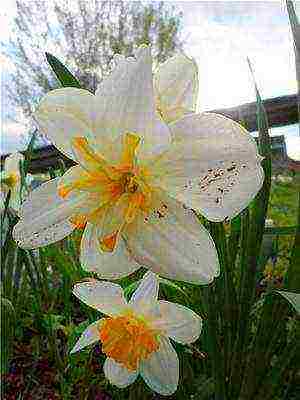
"Riesling". The flower is 9.5 cm in diameter, light lemon yellow, the crown is split almost to the base with a corrugated edge. Medium late. It is mainly used for cutting.
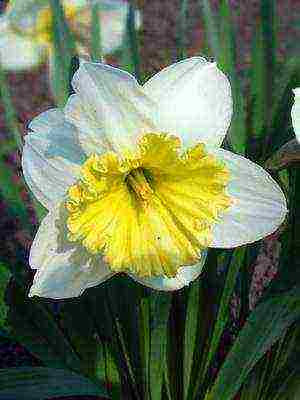
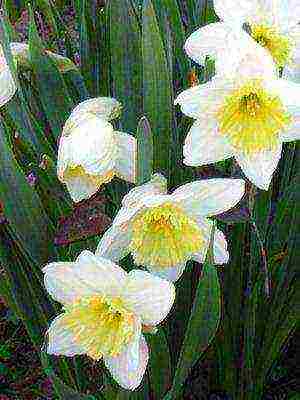
Royal Hayness. A flower 10 cm in diameter with a white perianth, a yellow-orange crown, curly, corrugated, with a wavy edge. Medium, versatile.
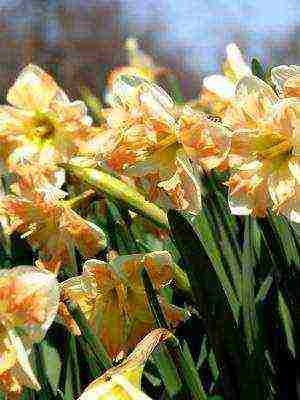
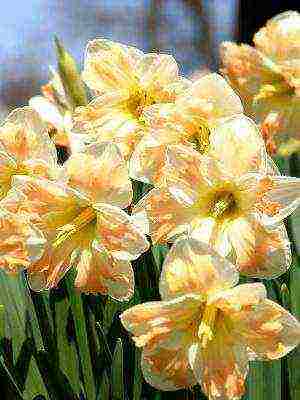
"Sanker". Flower 11.5 cm in diameter with a creamy white perianth, azalea crown, light cream with a wavy edge, 9 cm in diameter. Medium, universal.
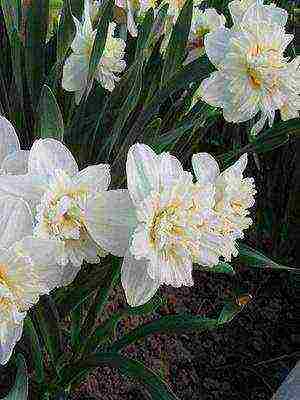
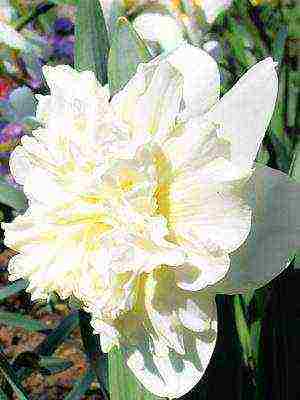
Silver Shell. A flower 10-11 cm in diameter with a white perianth, a large crown (8.5 cm), soft cream, corrugated. Early, versatile.
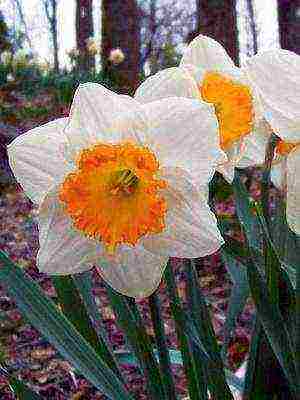
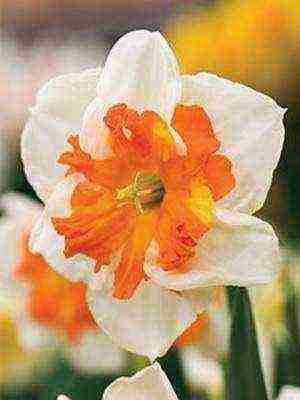
Sovrin. Flower with a diameter of 8-9 cm with a white perianth, bright orange crown, corrugated. Medium, versatile.
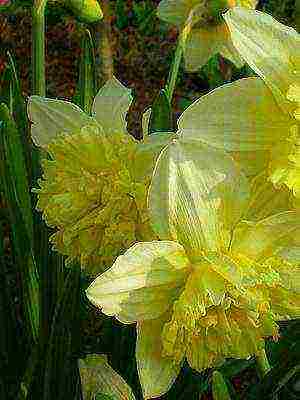
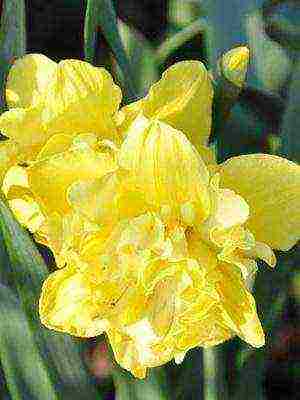
Flyer. A very spectacular one-color bright yellow flower (11-12 cm), curly crown, corrugated with outgrowths. Medium late, versatile.
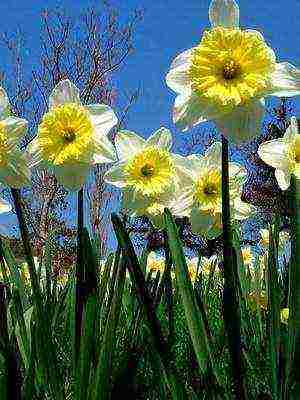
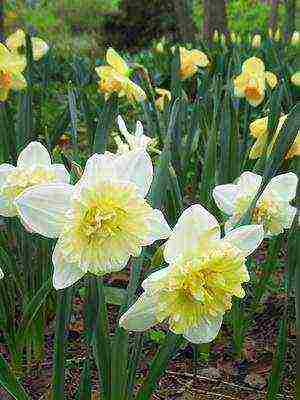
"Egard". A flower 10.5 cm in diameter with a white perianth and a lemon-yellow crown. Late, versatile.
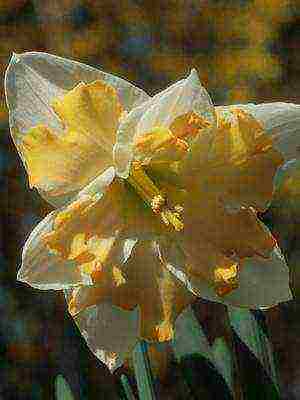
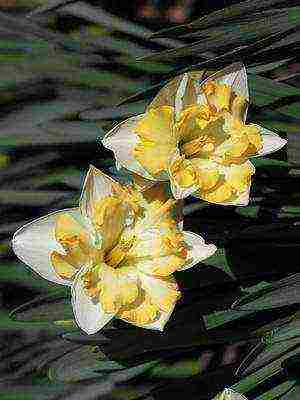
Etincelant. Flower with a diameter of 10 cm with a white perianth, azalea crown, creamy pink. Medium late, versatile.
12. This group includes all other daffodils not included in the previous groups.

